Now that the fake king is gone, Baron Castle is back to normal!
Turn A Monster
 | 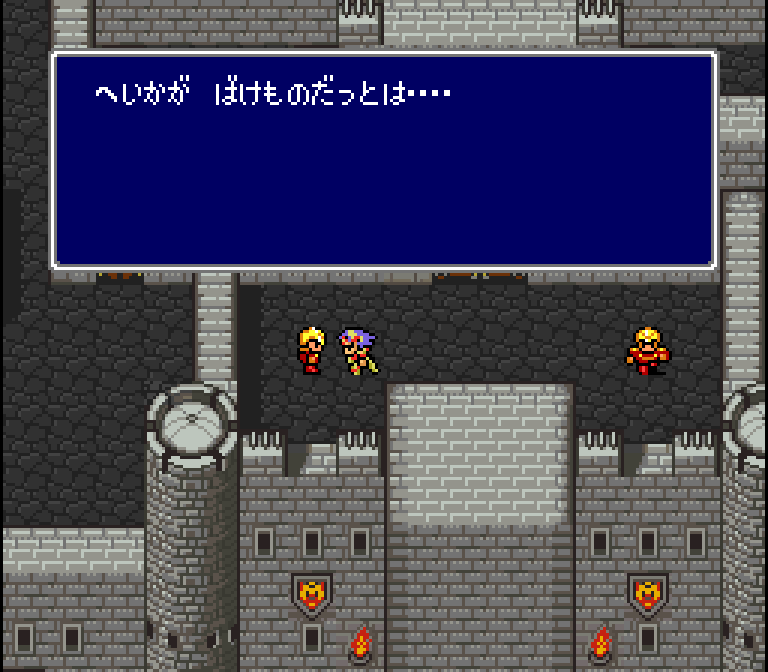 | 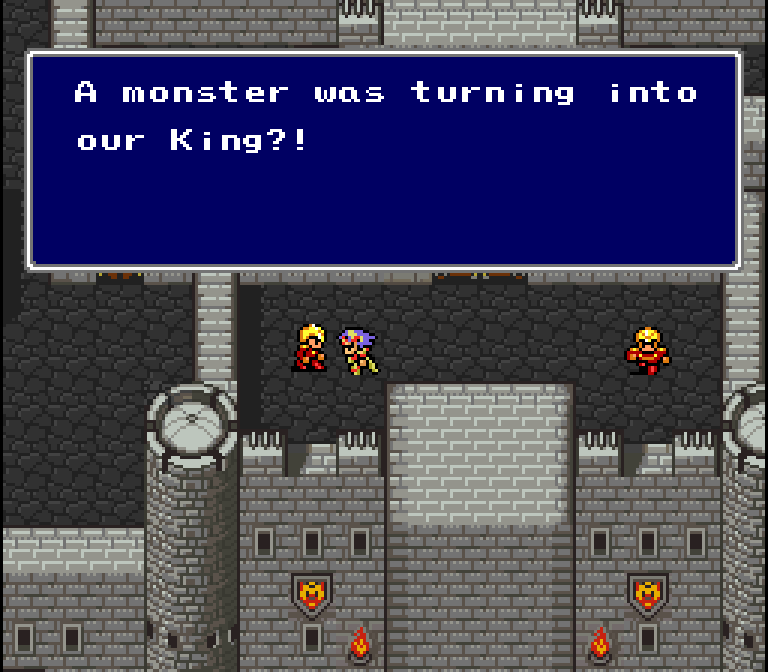 |
| Final Fantasy IV (Original) | Final Fantasy IV (Easy Type) | Final Fantasy II (Super NES) |
One of the guards speaks oddly in English:
| Japanese Version (basic translation) | English Translation |
| To think that His Majesty was a monster…. | A monster was turning into our King?! |
It’s such a simple line, but there are a few things of interest:
- The English translation uses the past progressive tense when it shouldn’t. In less fancy terms, the translator should have left out “turning into”. Non-native English speakers tend to have trouble with this verb tense in English – in fact, this same mistake appeared in a Baron NPC’s line just a few minutes earlier.
- “King” probably shouldn’t be capitalized. By this point it’s not a huge deal, though.
- The translated text uses “?!” rather than “!?” – based on past instances, this seems to indicate this line did have an editor look over it or that it was translated by a secondary translator.
What’s most interesting, though, is that the Japanese line actually has a typo! It says ばけものだっとは (bakemono datto wa) but it’s missing a character and should say ばけものだったとは (bakemono datta to wa) instead.
This typo remained in Easy Type, but was apparently fixed in later releases:
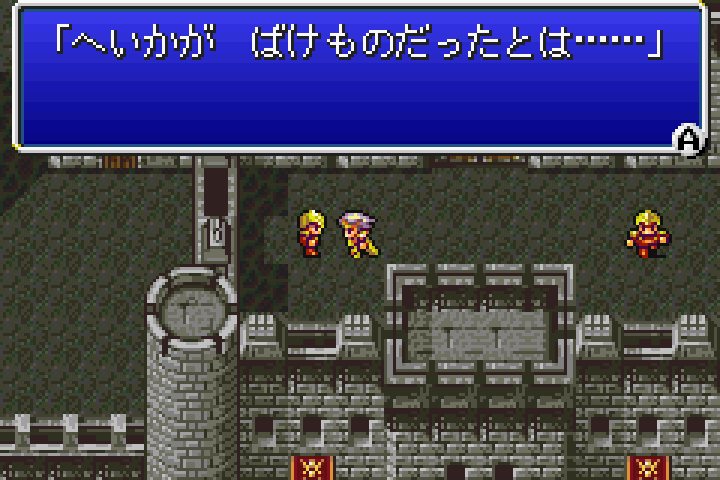
I think there are a few other Japanese typos like this in the game – I’ll try to include them if I can remember them when they appear.
Under Control
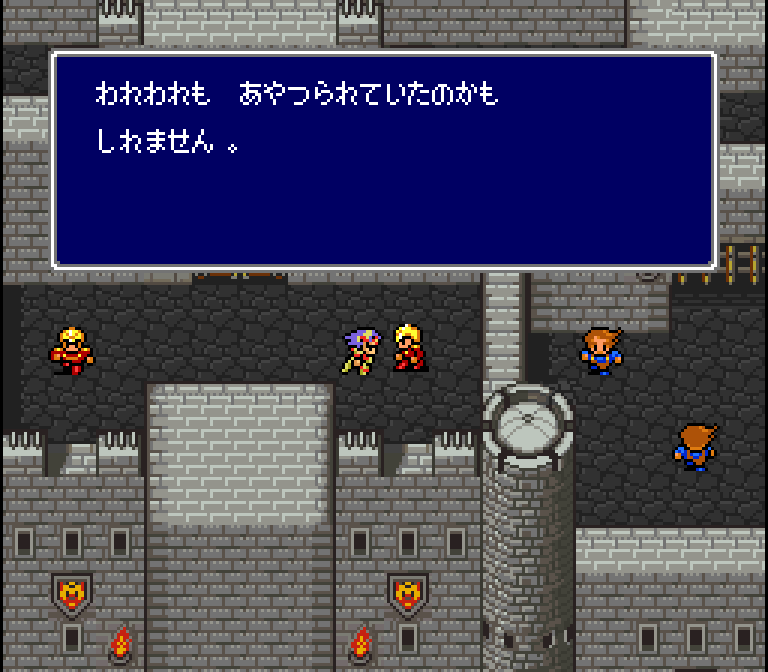 | 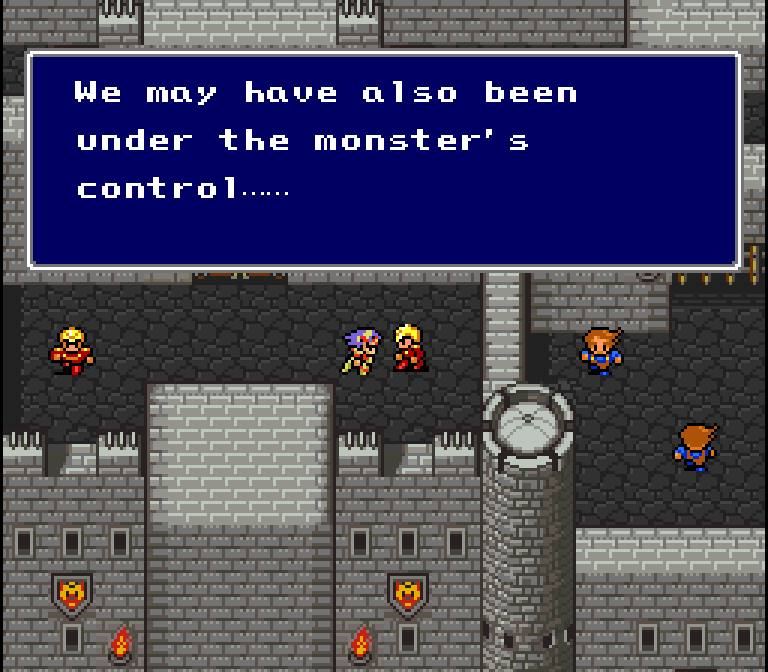 |
| Final Fantasy IV (Super Famicom) | Final Fantasy II (Super NES) |
This other guard also talks about what’s happened:
| Japanese Version (basic translation) | English Translation |
| We may have been controlled too. | We may have also been under the monster’s control…… |
The difference here is that the English version says that it’s the monster that was controlling them – I’m assuming this “monster” is referring to Cagnazzo/Kainazzo.
The Japanese line doesn’t indicate who was doing the controlling, though. I was under the impression that it was Golbez who could brainwash people, but maybe that’s not the case. In any case, the original Japanese line doesn’t specify it one way or the other.
Hearing Voices
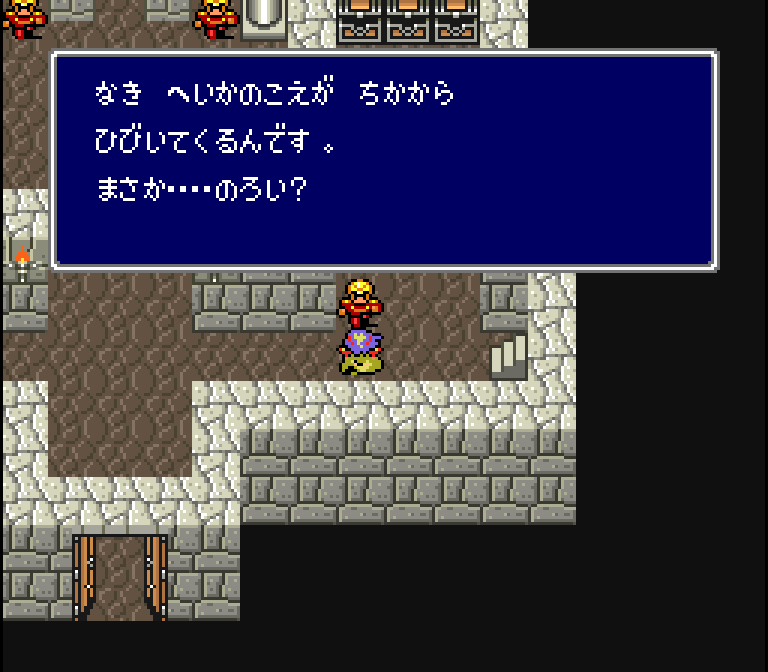 |  |
| Final Fantasy IV (Super Famicom) | Final Fantasy II (Super NES) |
A guard inside the castle comments on some recent events.
| Japanese Version (basic translation) | English Translation |
| The voice of the late king echoes up from the basement. | I hear voices from the basement! |
| Could it be… a curse? | I’m scared. |
The very first thing that strikes me is the tone of the text – close your eyes and pretend someone is reading the Japanese line out loud. It probably sounds like an adult or at least neutral-sounding, right? Now do the same with the English line. It probably sounds like something a little kid would say, right?
In any case, the important difference here is that the Japanese line tells you flat-out that the king’s voice can be heard from the basement. The English line makes it vague. Reading the Japanese line, I’d immediately be like, “Oh man, I better go check it out, then!” while the English line doesn’t really establish that same level of urgency.
The Poor King
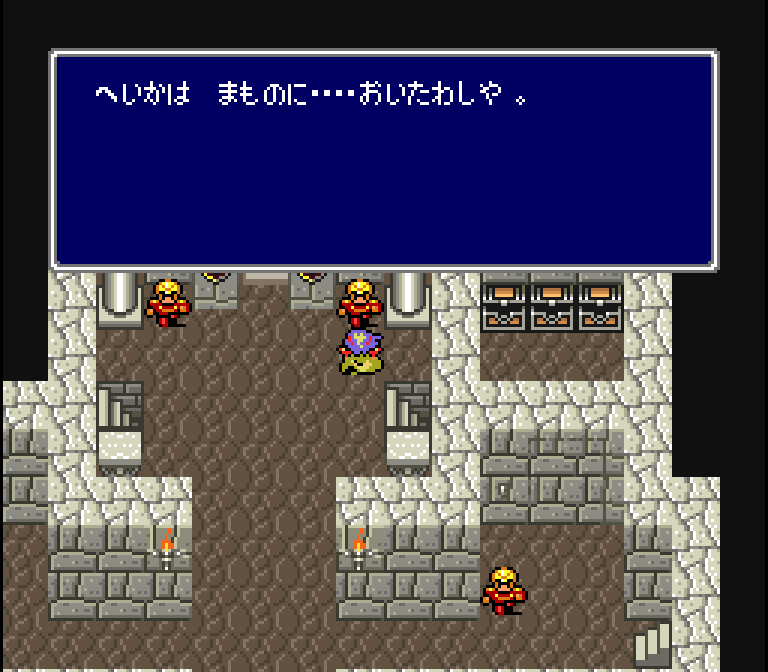 | 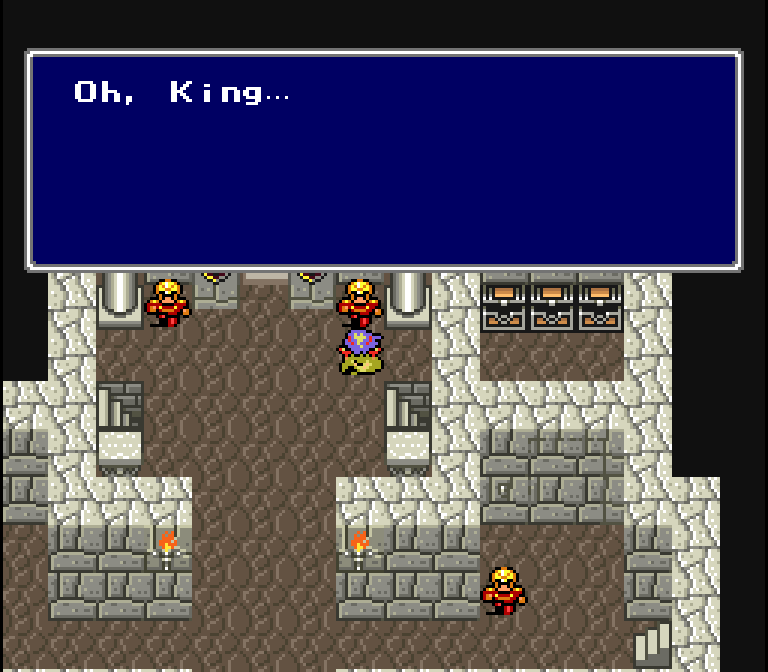 |
| Final Fantasy IV (Super Famicom) | Final Fantasy II (Super NES) |
This other guard is saddened by the king’s death.
| Japanese Version (basic translation) | English Translation |
| His Majesty, killed by a monster…. | |
| What a pity. | Oh, King… |
The second line in the Japanese text is a little tough to convey literally in English without sounding sarcastic, but it’s a sincere feeling of sadness and regret. The first line is also one of those incomplete sentences that leave the verb out, but “killed” or “slain” fits the context.
The big thing, though, is that the entire line about the king being done in by a monster was taken out of the translation.
Piggies Big and Small
 | 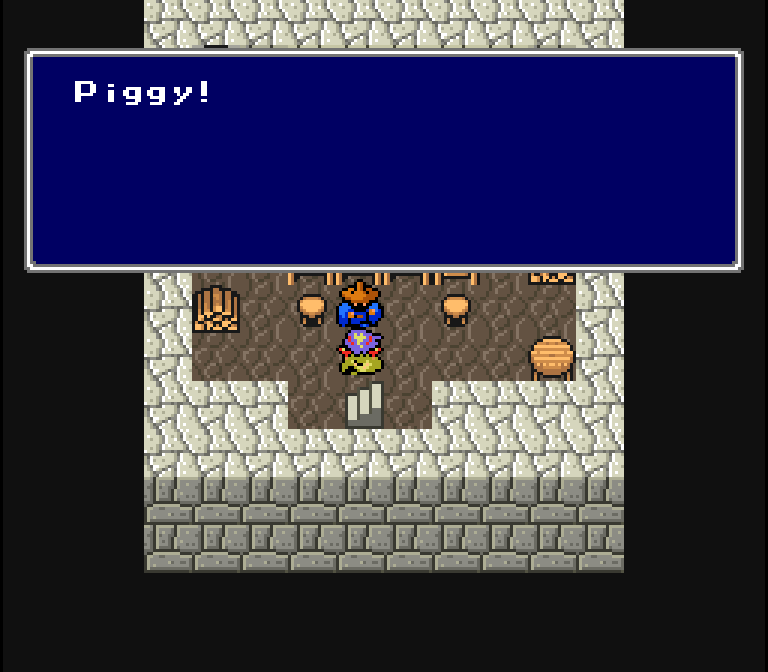 |
| Final Fantasy IV (Super Famicom) | Final Fantasy II (Super NES) |
One of the black wizards in the castle accidentally casts a spell on you:
| Japanese Version (basic translation) | English Translation |
| Porky! | Piggy! |
| Ahh! | Ooops! |
| Oh, no! | Excuse me! |
| I’m sorry! That was Minimum! | Sorry! It was Size! |
As you can probably guess, the spell that changes a target into a pig is called “Porky” in the Japanese version and “Piggy” in the English translation. Similarly, the spell that turns a target into a tiny person is called “Minimum” in Japanese and “Size” in the English release.
Also, “Ooops” could be a typo, but even if it isn’t I still like it. It definitely adds to the oops feel, and all it took was an extra o!
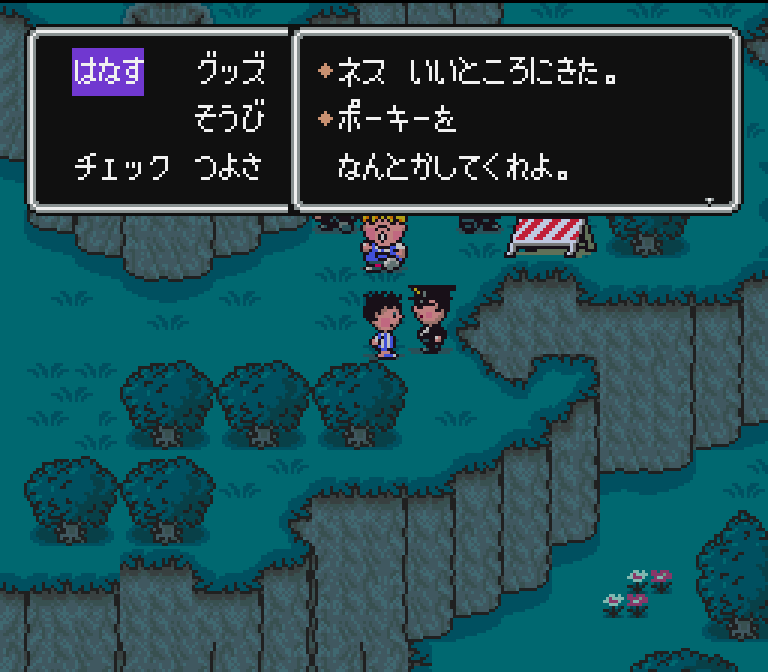
On a mostly unrelated note, the name of Ness’s annoying neighbor was spelled this exact same way (ポーキー) in MOTHER 2. Due to the weirdness of the language barrier, though, “Pokey” is how his name was translated when the game was localized into English as EarthBound, rather than “Porky”. Being such a big MOTHER 2/EarthBound fan, seeing this name turn up Final Fantasy IV never fails to surprise me!
Lacking Something
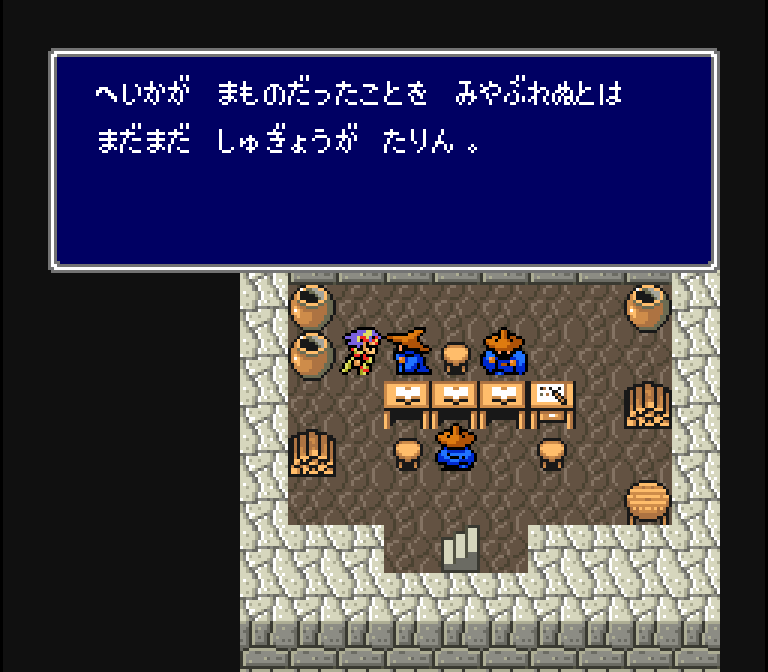 |  |
| Final Fantasy IV (Super Famicom) | Final Fantasy II (Super NES) |
This other black wizard talks about the king’s deception:
| Japanese Version (basic translation) | English Translation |
| Being unable to see that the king was actually a monster… I am still greatly lacking in training. | I’m embarrassed that I couldn’t spot the fake king. |
Here’s another instance of “king” not being capitalized in the script when it’s been capitalized almost every other time. But it should be lowercase anyway, so it’s all good.
In actuality, the Japanese line doesn’t specify a subject, so it could say either “I lack training” or “We lack training”. It looks like the official English translation went the “I” route. It also replaced the comment on the lack of training with a comment about being embarrassed.
It Exists
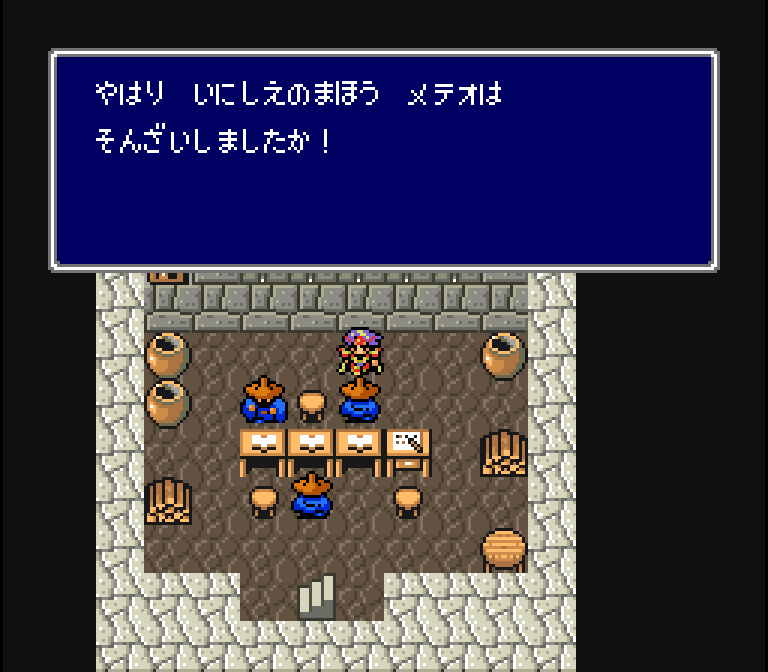 | 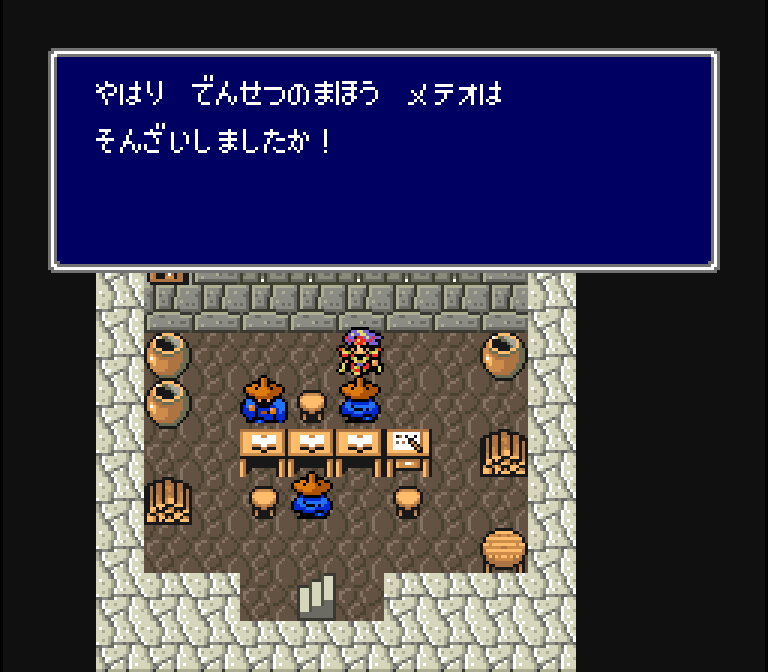 | 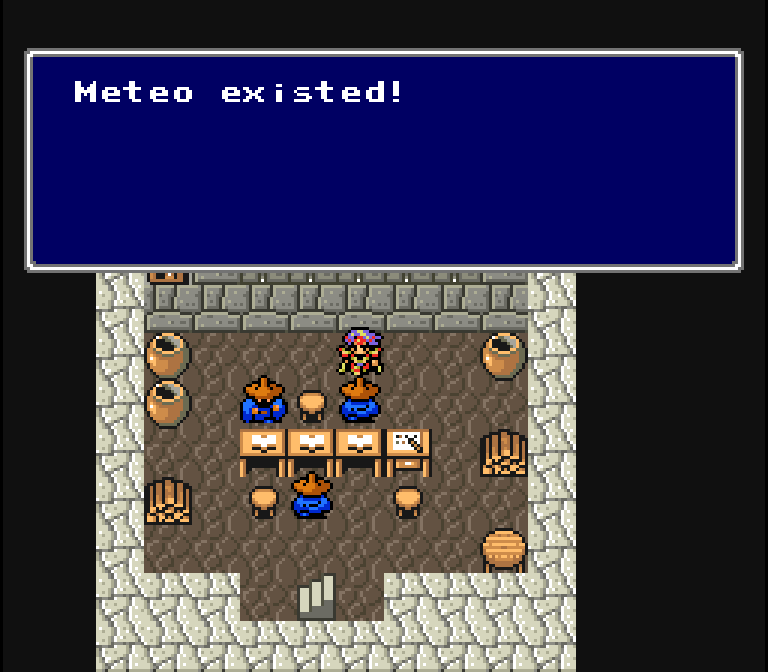 |
| Final Fantasy IV (Original) | Final Fantasy IV (Easy Type) | Final Fantasy II (Super NES) |
The third black wizard here talks about Meteo.
| Final Fantasy IV (basic translation) | Final Fantasy IV Easy Type (basic translation) | Final Fantasy II (Super NES) |
| So the spell from antiquity, Meteo, does exist! | So the legendary Meteo spell does exist! | Meteo existed! |
Meteo’s a big deal, so let’s look at this quickly:
- This is another instance where the Easy Type script changes a possibly fancy and difficult word with a simpler one, presumably to make it easier for younger audiences to appreciate.
- The Japanese lines technically use what equates to the past tense in English, but in this context the past tense actually signifies, “It turns out that…” In other words, “It turns out that Meteo exists.” If that doesn’t make much sense, don’t worry, it’s just super-nitpicky verb stuff. It’s also why it might seem a little odd that the guy says, “Meteo existed!” in English when it still exists. This is another common verb mistake non-native English speakers from Japan make. Another memorable instance was a line in EarthBound about dinosaurs existing.
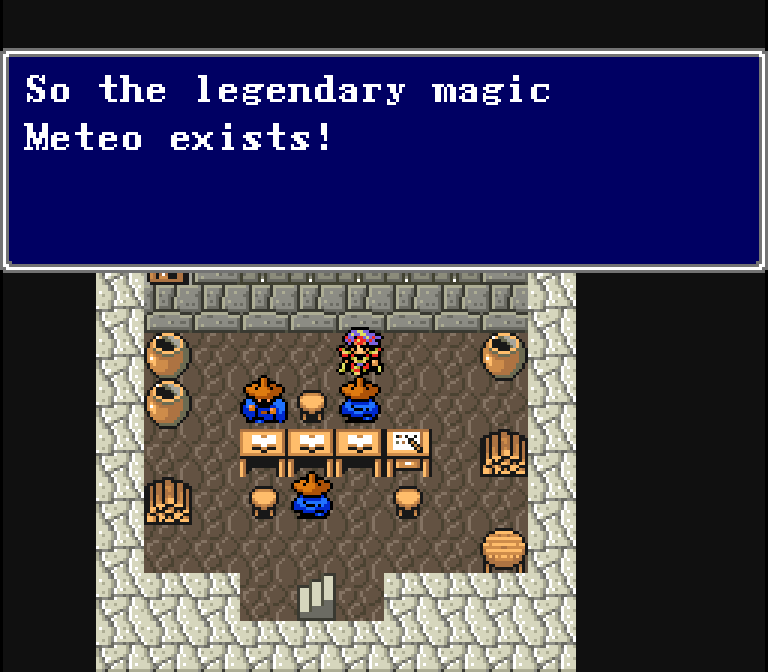
Also, for some reason, the fan translation translates this line as “legendary spell” rather than “ancient spell” or what have you. I can’t help but wonder how this happened – did someone work off of the Easy Type script at some point? If so, that’s a pretty bizarre choice. Either that, or it just turned into “legendary” during the polishing stage.
RIP
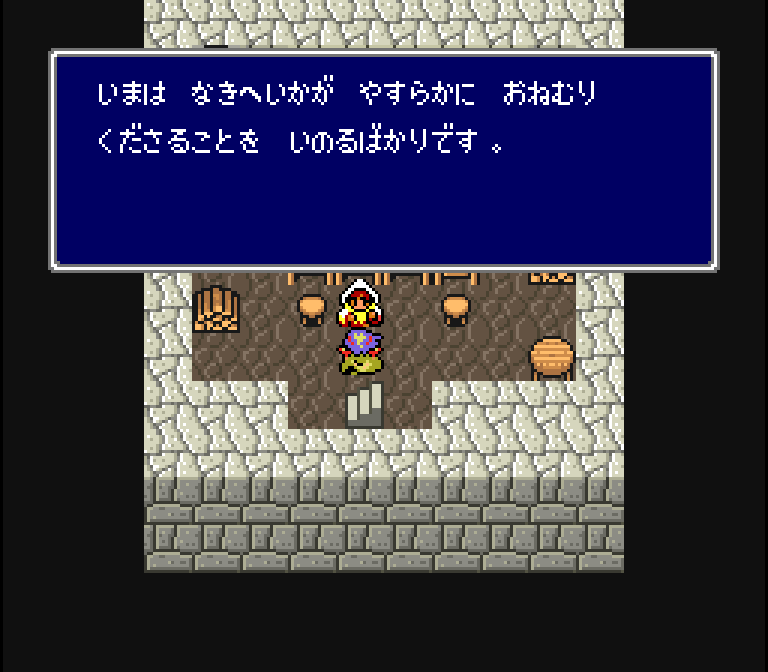 | 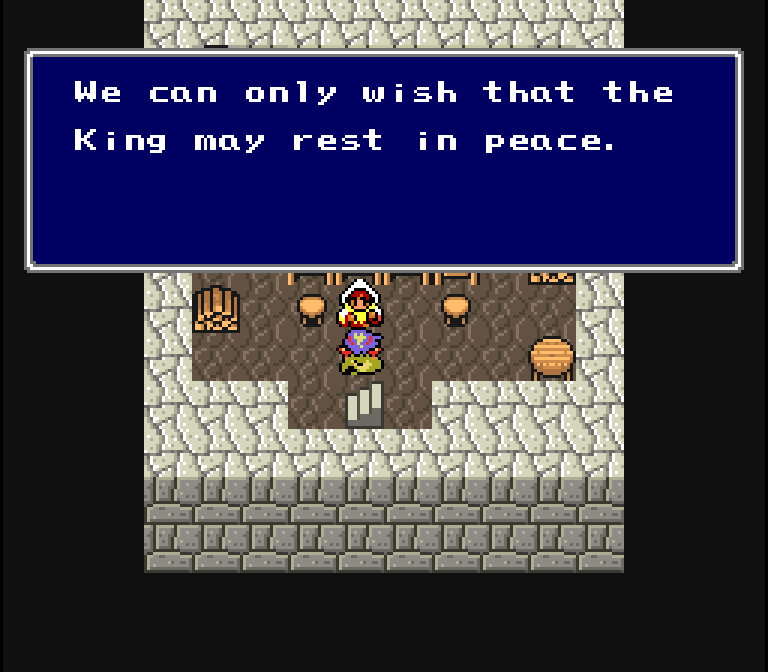 |
| Final Fantasy IV (Super Famicom) | Final Fantasy II (Super NES) |
This white wizard talks about the king:
| Japanese Version (basic translation) | English Translation |
| We can only pray now that His Majesty will rest in peace. | We can only wish that the King may rest in peace. |
The lines are essentially the same, except the reference to praying was changed to wishing. This fits with similar changes made earlier in the game as well.
A Great Fake
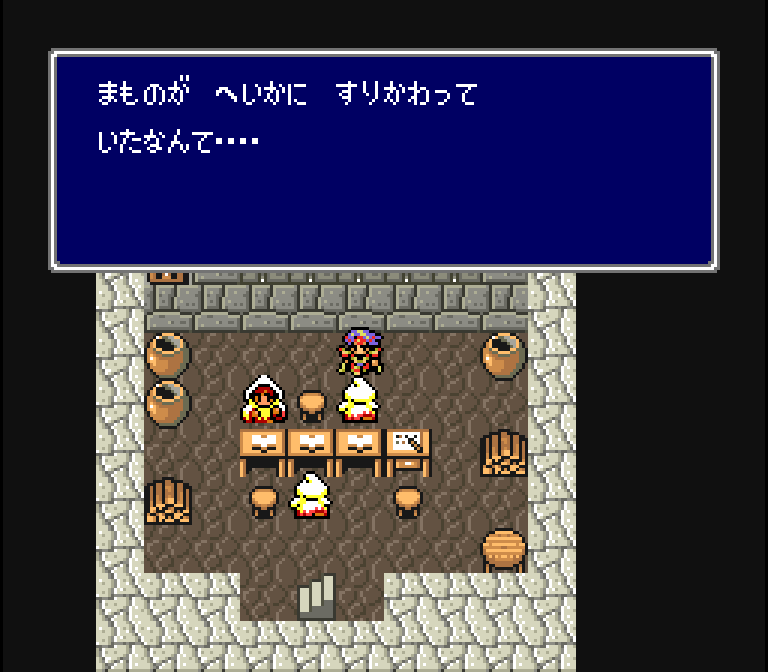 |  |
| Final Fantasy IV (Super Famicom) | Final Fantasy II (Super NES) |
This other wizard talks about the fake king:
| Japanese Version (basic translation) | English Translation |
| To think that a monster had taken the king’s place…. | I couldn’t tell that the King was fake… |
The Japanese line seems to be expressing regretful surprise, while the English line is more like a regretful lapse in ability.
The Value of Life
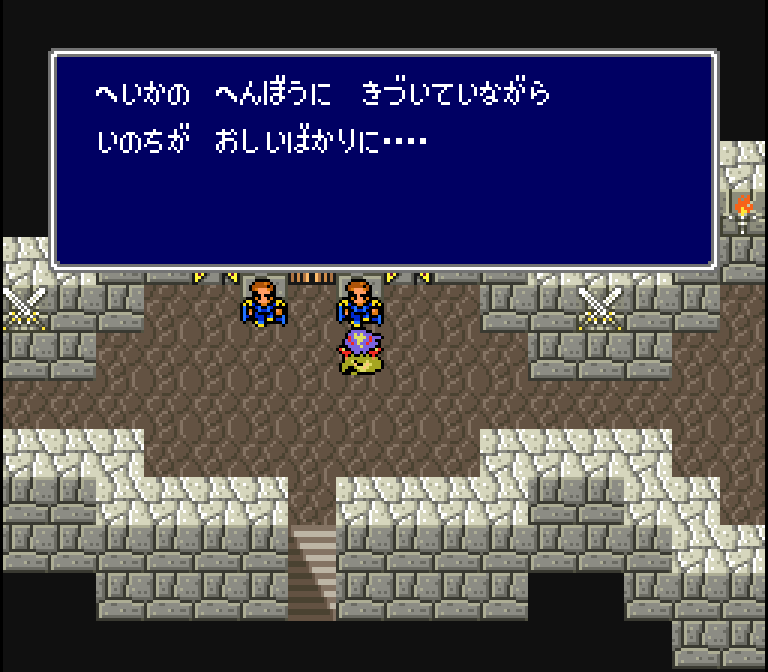 | 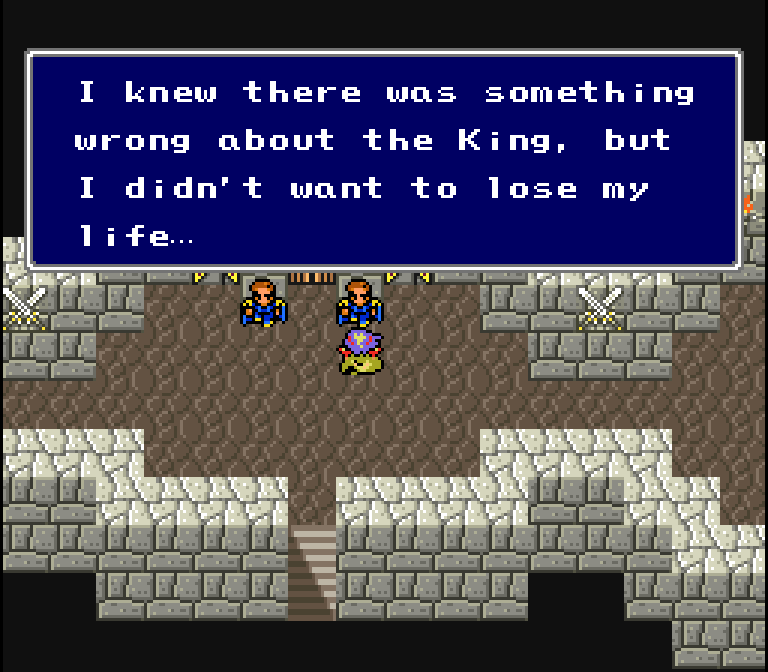 |
| Final Fantasy IV (Super Famicom) | Final Fantasy II (Super NES) |
This elite guard says that he knew something was off about the king:
| Japanese Version (basic translation) | English Translation |
| I was aware of His Majesty’s change, but I was so fearful for my life… | I knew there was something wrong about the King, but I didn’t want to lose my life… |
Aside from the capitalization thing, I actually really like this translation. Good job, whoever did it!
Holding Down the Fort
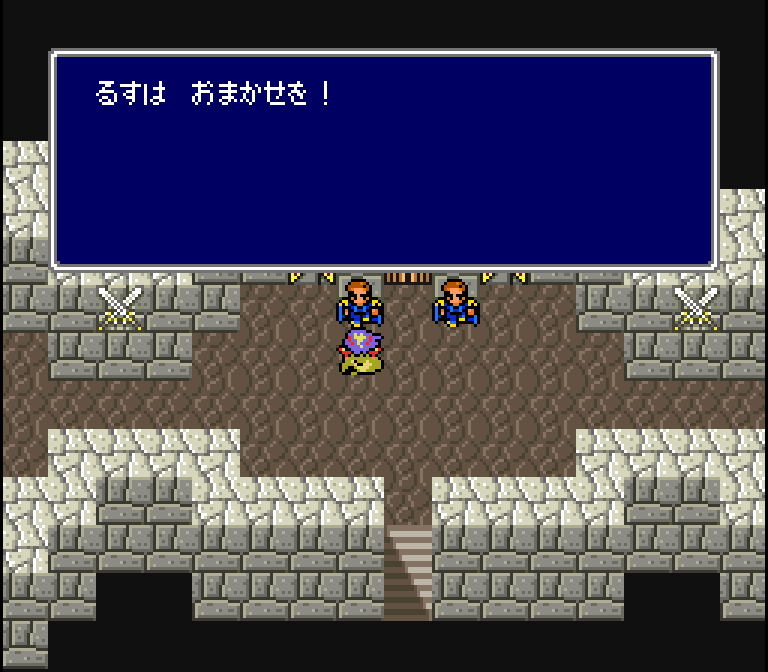 | 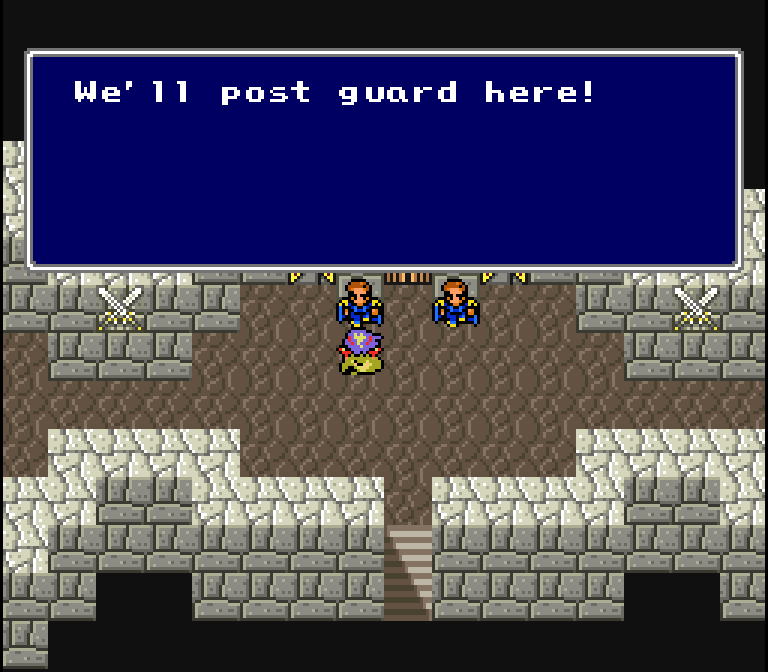 |
| Final Fantasy IV (Super Famicom) | Final Fantasy II (Super NES) |
The other elite guard has a short line for Cecil:
| Japanese Version (basic translation) | English Translation |
| Leave us to guard the place in your absence! | We’ll post guard here! |
This English line always seemed a little strange to me and made me go, “Huh? Okay…” I guess I didn’t understand why guards were saying they were going to guard the place.
The Japanese line makes it a little clearer that he’s saying they’ll guard the place while you’re away – that you can go do your own stuff and not worry about protecting the castle. Actually, it could also be taken as saying that they’ll guard the place while there’s no king too, but the former seems more natural and likely.
No Sir
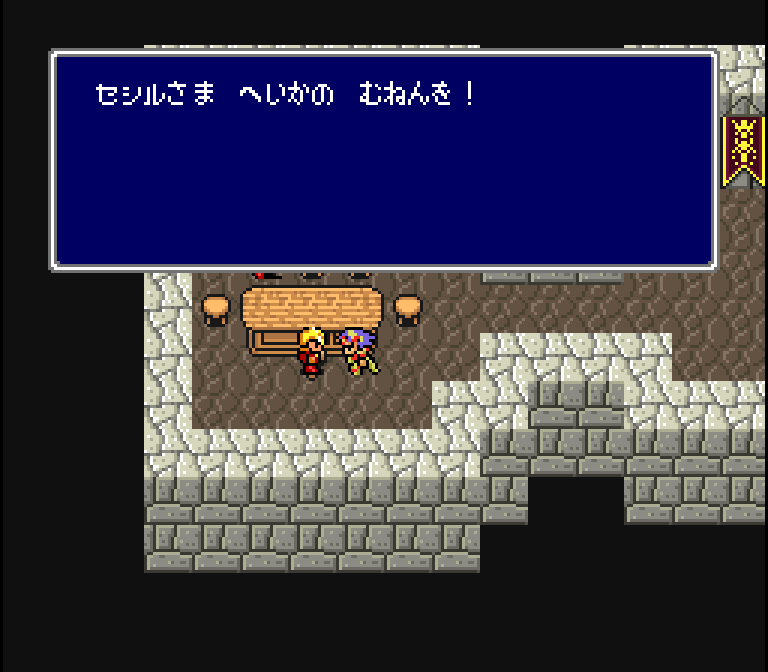 | 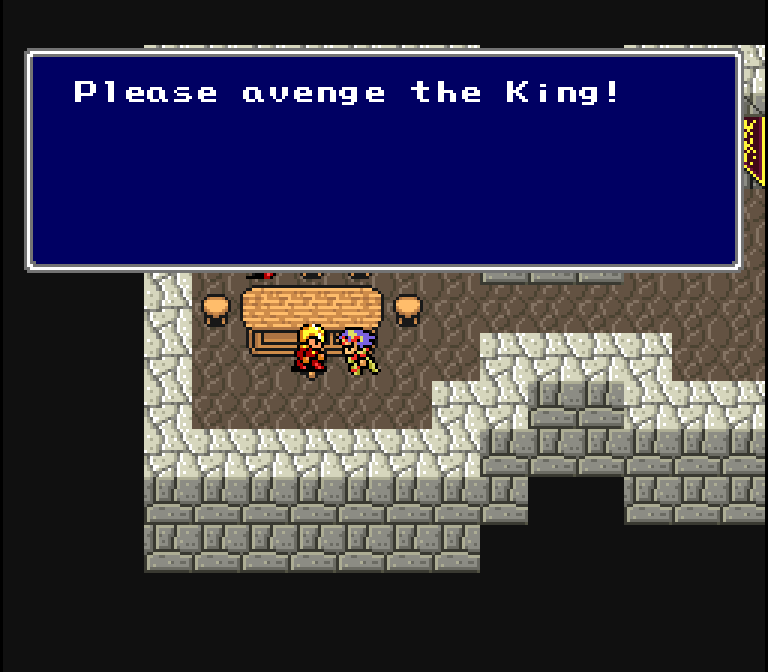 |
| Final Fantasy IV (Super Famicom) | Final Fantasy II (Super NES) |
This soldier has something to say to Cecil:
| Japanese Version (basic translation) | English Translation |
| Sir Cecil! Please avenge His Majesty! | Please avenge the King! |
The English line leaves out the specific reference to Cecil, as well as the polite / superior form of address.
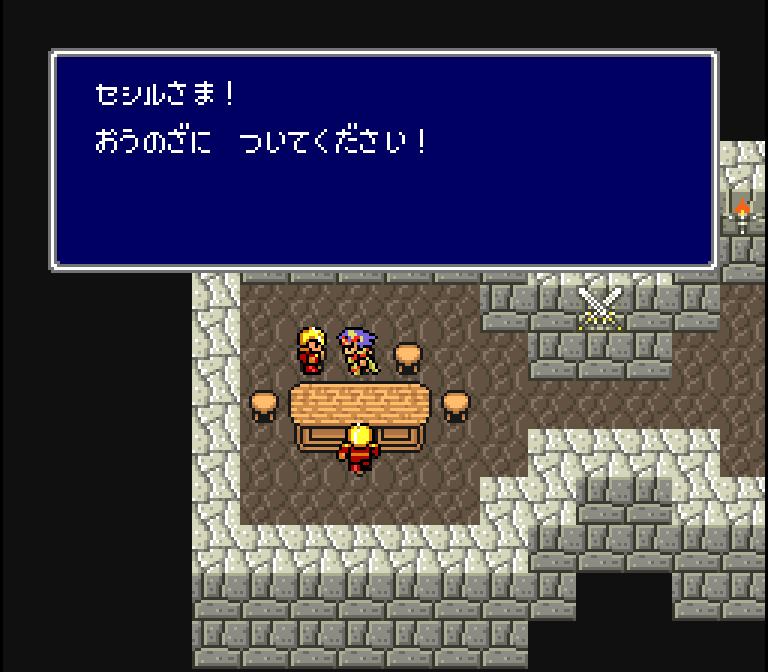 | 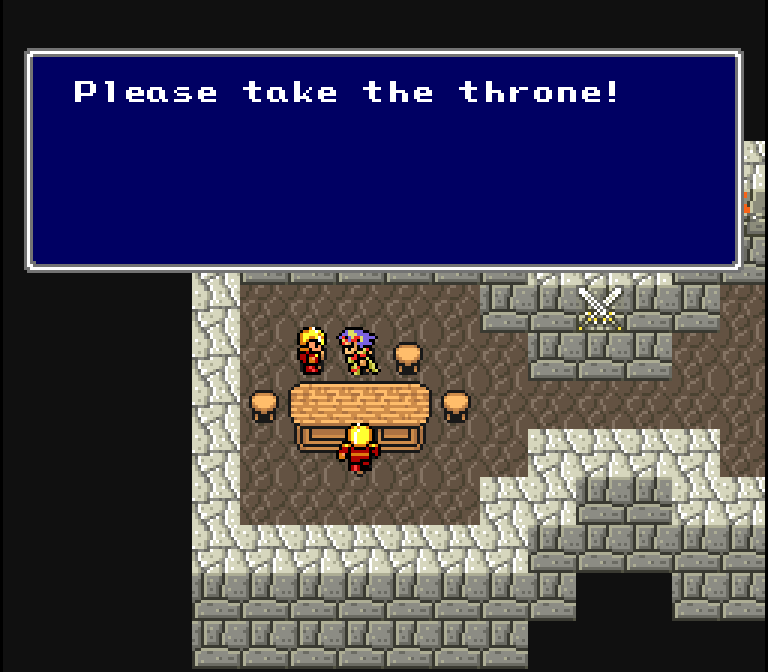 |
| Final Fantasy IV (Super Famicom) | Final Fantasy II (Super NES) |
The other soldier in this part of the castle also has something to say:
| Japanese Version (basic translation) | English Translation |
| Sir Cecil! | |
| Please take the throne! | Please take the throne! |
Again, we see that the specific mention of Cecil’s name, along with the polite form of address, was removed in the English translation. I assume it was simply to save memory for more important text.
Dragoon Defense
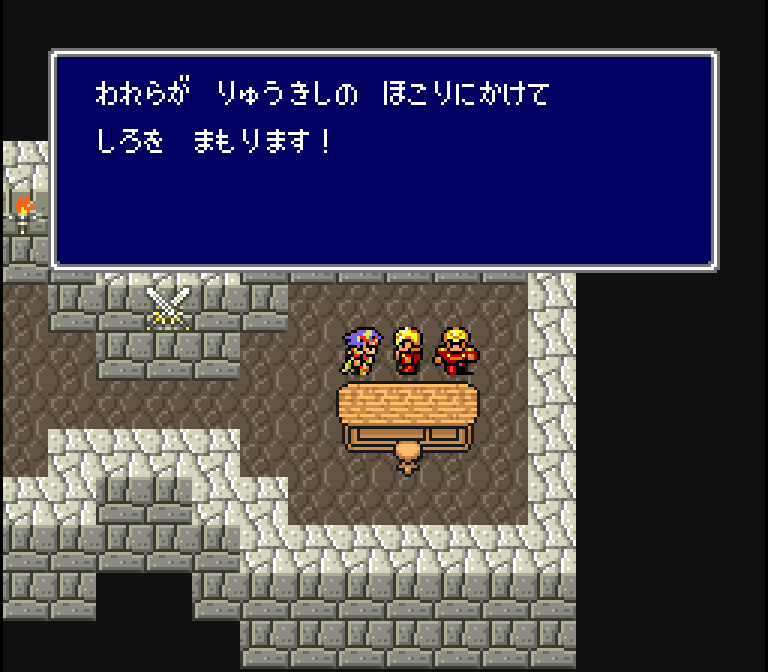 | 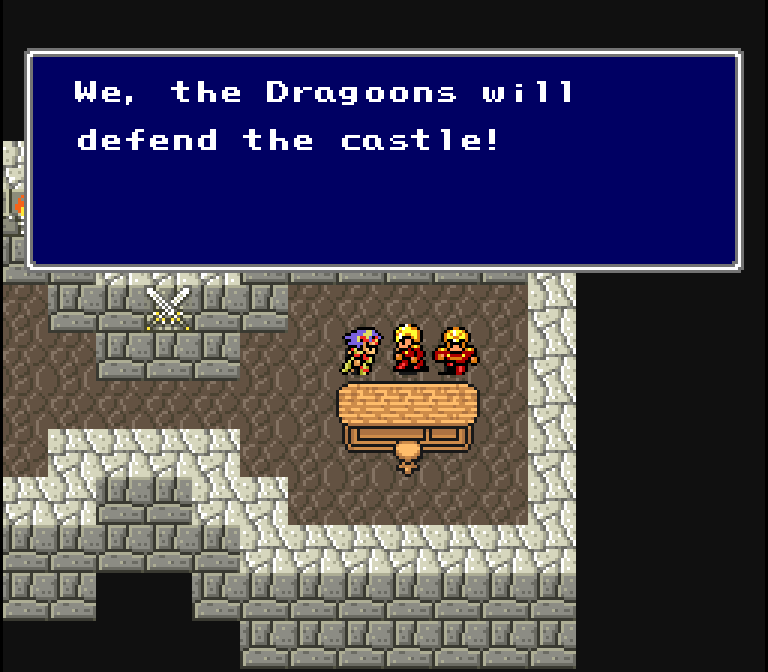 |
| Final Fantasy IV (Super Famicom) | Final Fantasy II (Super NES) |
One of the Dragoons gives a spirited comment:
| Japanese Version (basic translation) | English Translation |
| On the pride of the Dragon Knights, we will defend the castle! | We, the Dragoons will defend the castle! |
The English translation removes the part about pride. It’s not a big change at all, but honor and pride are usually pretty important to knights in stories like this, so the original line carries a little something more.
Also, it’s pretty nitpicky, but the English line could probably use another comma after “Dragoons”.
Facing Kain
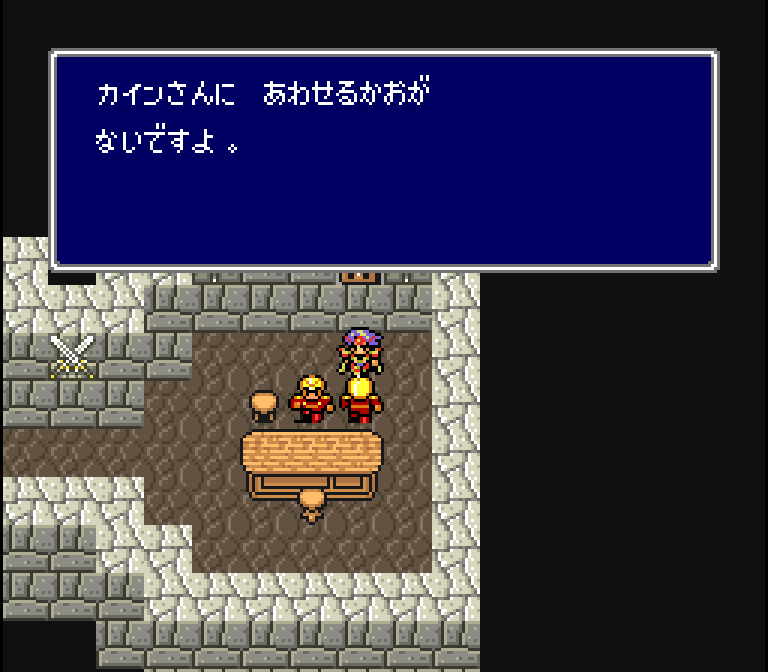 |  |
| Final Fantasy IV (Super Famicom) | Final Fantasy II (Super NES) |
The other Dragoon talks about his feelings:
| Japanese Version (basic translation) | English Translation |
| I’m too ashamed to face Mr. Cain. | I’m ashamed. |
The Japanese line could also translate into, “I can’t face Mr. Cain.” In any case, the reference to Cain/Kain is missing in the English translation entirely.
Unstoning Palom and Porom
First, an anecdote!
I didn’t really get any serious Internet access until the late 90s, but in the mid-90s a relative of mine did have AOL. The concept of the Internet was still so new to me that I didn’t really know what to do with it, but I guess one of the first things I did was look up Final Fantasy II stuff. There were a couple big FAQs written by other fans, which was a huge, jaw-dropping thing by itself. But these FAQs also had tons of crazy, detailed information I’d never heard about before. I’d already played the game to death, but suddenly these FAQs brought totally new life to it!
I remember many tidbits and tricks fondly, but one of the main things that stands out was something FAQ writers called the “Basilisk’s Eye”. This was apparently a secret item in the game that would let you un-stone Palom and Porom. “Wow!” I thought. The only way to get it was to use some Game Genie code to manipulate your inventory (ah, the good ol’ Gunslinger code)… except Palom and Porom still didn’t turn back to normal! This was my first time being duped by one of those gaming urban legends.
Now that I’m older, know Japanese, and can dig into the games’ programming, I can safely say that there is no Basilisk’s Eye item. It was just one of those hoaxes or jokes that got out of hand somehow. The next few games had similar hoaxes too, like reviving Aeris in Final Fantasy VII or General Leo in Final Fantasy VI (although someone DID figure out how to get Leo into your party years later). I guess it’s just something that Final Fantasy fans liked to do to troll each other.
Actually, now that I think about it, wouldn’t a Basilisk’s eye cause petrification rather than cure it? What a weird rumor that was.
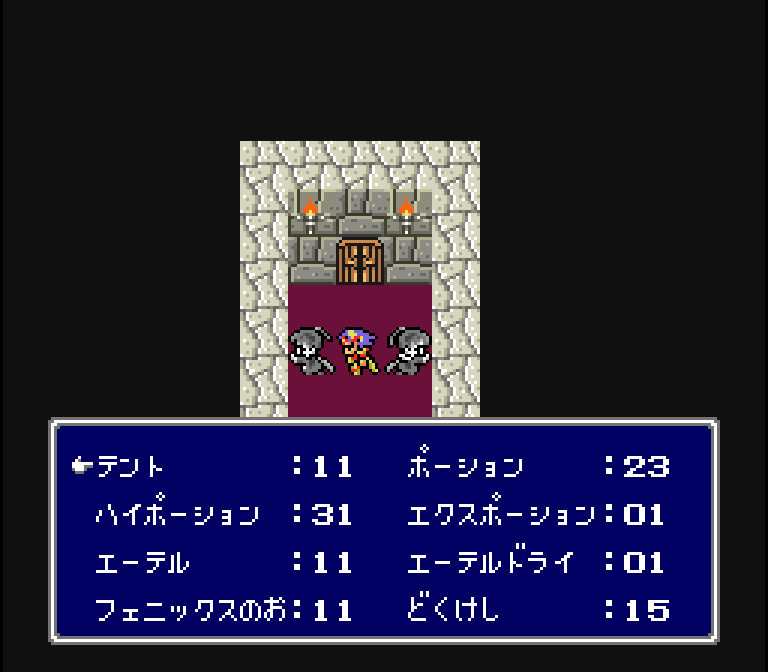 | 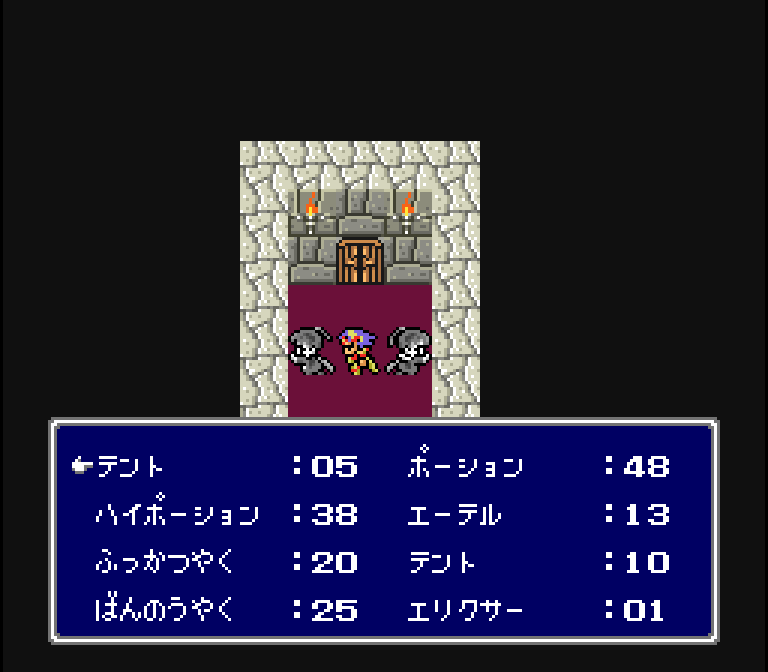 | 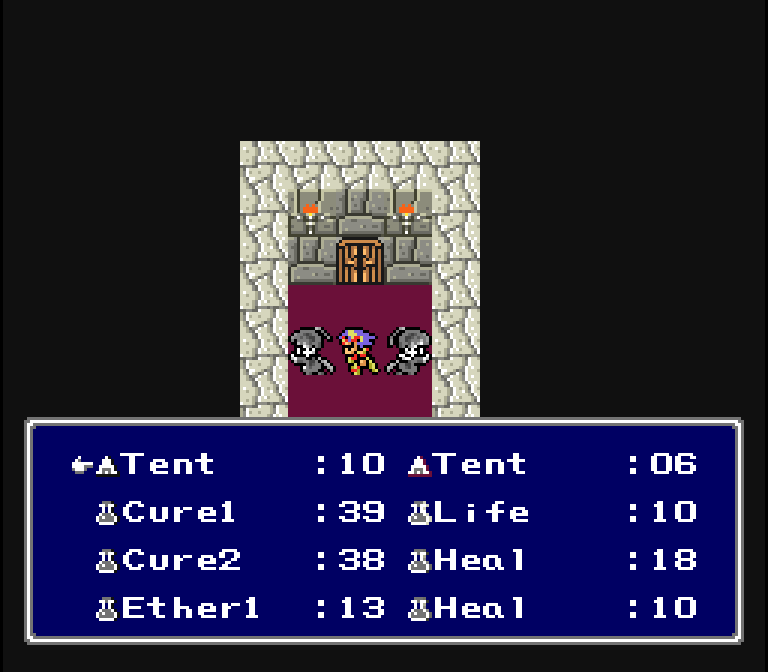 |
| Final Fantasy IV (Original) | Final Fantasy IV (Easy Type) | Final Fantasy II (Super NES) |
If you try to use a Heal potion on the twins in Final Fantasy IV Easy Type or Final Fantasy II, the game will give you the response of, “Nothing happened.” This is the response it gives for every item, though.
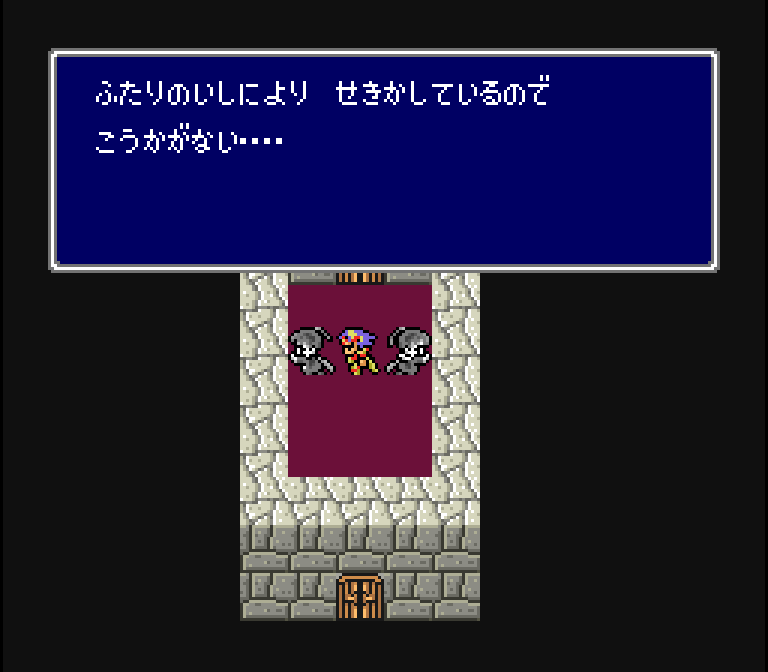
But, remember how original Final Fantasy IV has specific remedies for specific ailments? Well, if you try to use a Gold Needle (which normally heals the stone status), the game gives you a different response:
There’s no effect, as they’ve been turned to stone of their own will….
This is the same thing it said when Tellah tried to heal them earlier, so maybe that earlier line was the game making an observation and not Tellah saying anything.
Never Say Never
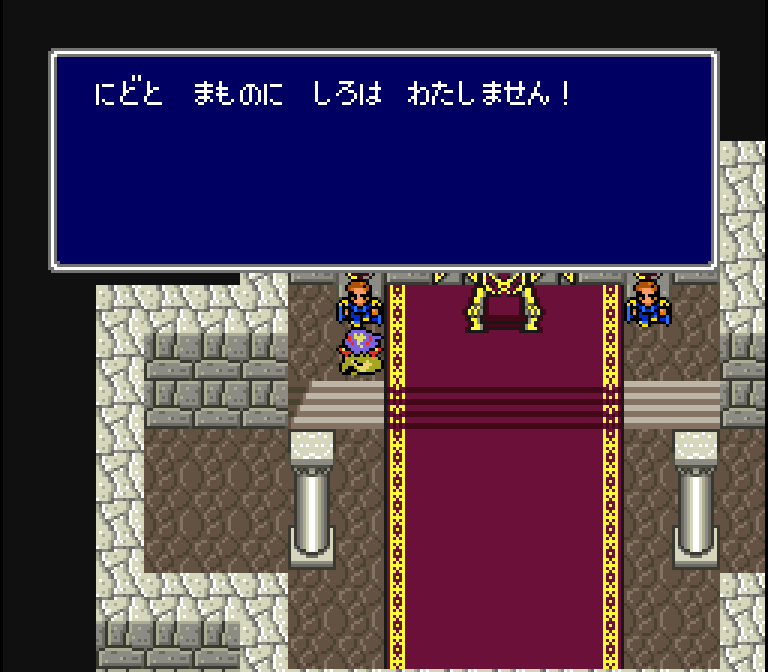 | 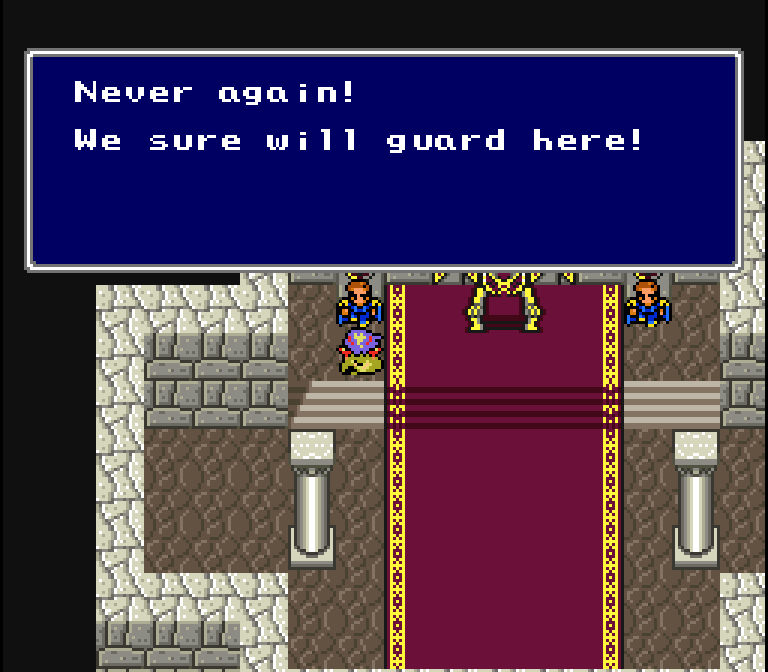 |
| Final Fantasy IV (Super Famicom) | Final Fantasy II (Super NES) |
This guard next to the throne has a very determined attitude:
| Japanese Version (basic translation) | English Translation |
| Never again will we hand over the castle to a monster! | Never again! |
| We sure will guard here! |
The English translation changes things a bit and manages to sound laughingly awkward at the same time. I can almost “feel” the native Japanese translator’s thought process when working on this new line – it probably involved the word 必ず or maybe something like 守り通す.
Dungeon Man
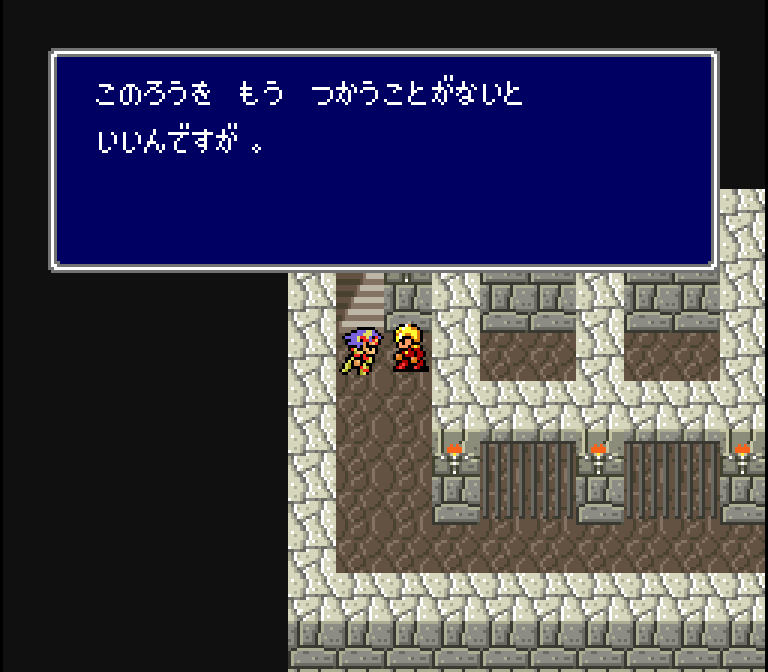 |  | 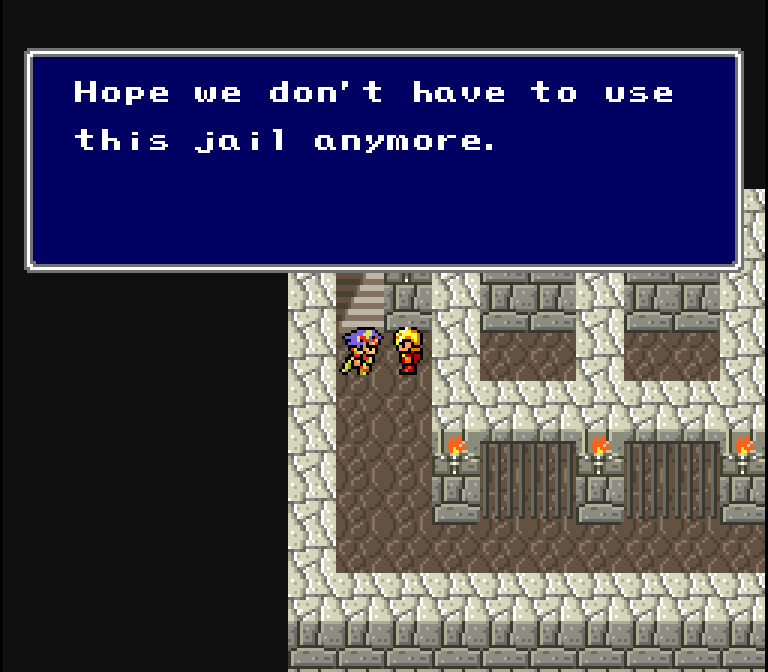 |
| Final Fantasy IV (Original) | Final Fantasy IV (Easy Type) | Final Fantasy II (Super NES) |
The soldier stationed at the prison has hopes for the future:
| Final Fantasy IV (basic translation) | Final Fantasy IV Easy Type (basic translation) | Final Fantasy II (Super NES) |
| I hope we won’t have to use these cells anymore. | I hope we won’t have to use this prison anymore. | Hope we don’t have to use this jail anymore. |
There’s no issue with the translation here, but if you look closely at the original Japanese line and the Easy Type line you’ll see they’re ever-so-slightly different.
It’s hard to convey in translation, but the Easy Type line basically changes the word for a prison or a prison cell into a clearer word.
No Recognition
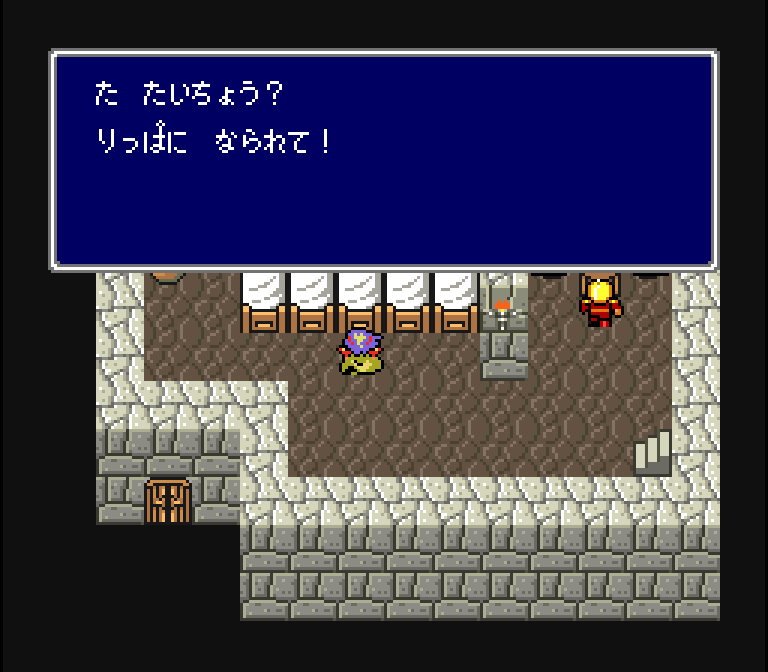 | 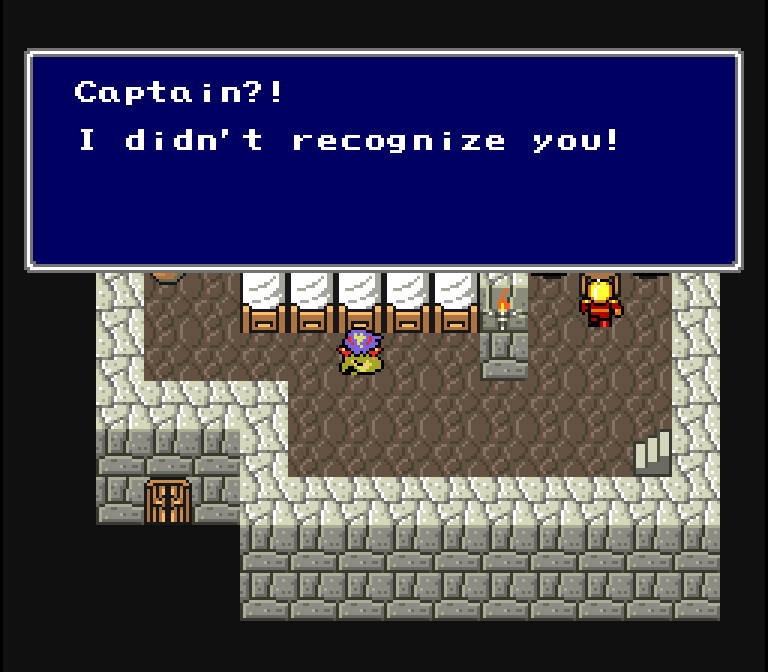 |
| Final Fantasy IV (Super Famicom) | Final Fantasy II (Super NES) |
This sleeping soldier is surprised to see Cecil.
| Japanese Version (basic translation) | English Translation |
| C-Captain? | Captain?! |
| You’ve become so dignified! | I didn’t recognize you! |
Again we see the rare instance of “?!” in here because “!?” wasn’t in the original line. The stuttering surprise is also missing in the translation.
The second line is also slightly different. He also speaks to Cecil in a very formal, polite way, as if Cecil were in a much higher social class. This sort of speech pattern is sort of built into the Japanese language (see here), but it can be difficult to reproduce the same thing in English simply because English does things differently.
Lead Us
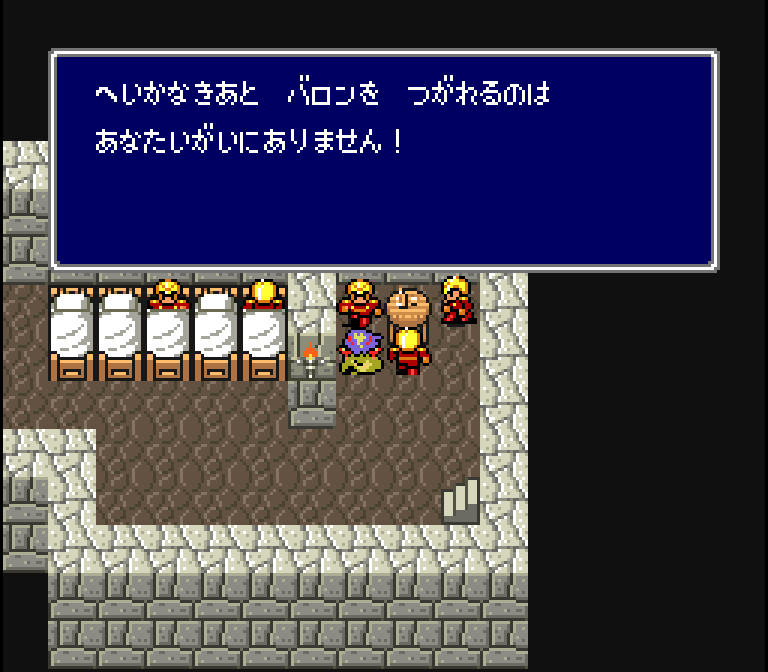 | 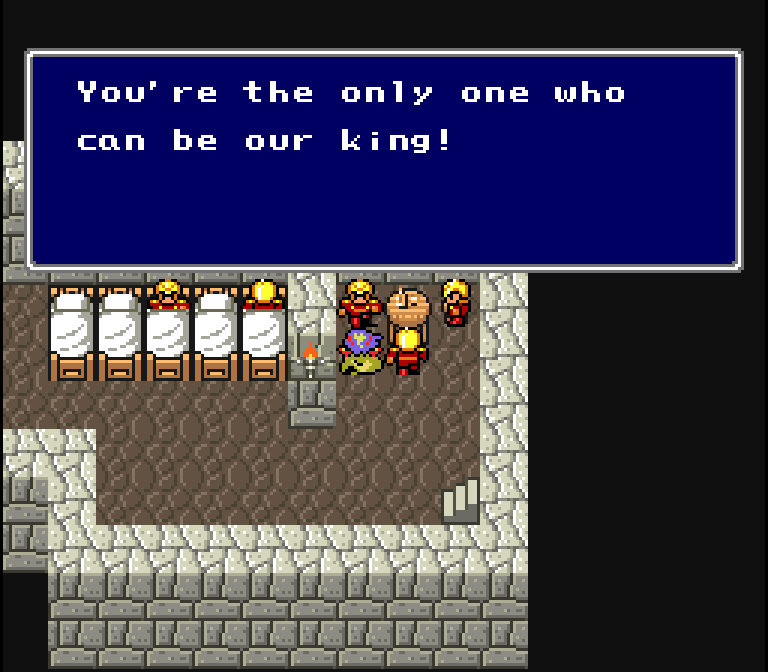 |
| Final Fantasy IV (Super Famicom) | Final Fantasy II (Super NES) |
One of the Red Wings soldiers wants Cecil to be king:
| Japanese Version (basic translation) | English Translation |
| You’re the only one who can be the late king’s successor! | You’re the only one who can be our king! |
The difference here is minor, but like I mentioned earlier, when playing the English translation as a kid, the whole deal about the king’s successorship never crossed my mind. I think it’s because the translation left out any mention of the word and took out the relationship Cecil had with the king as a kid, as mentioned early on in the Japanese script.
If Only
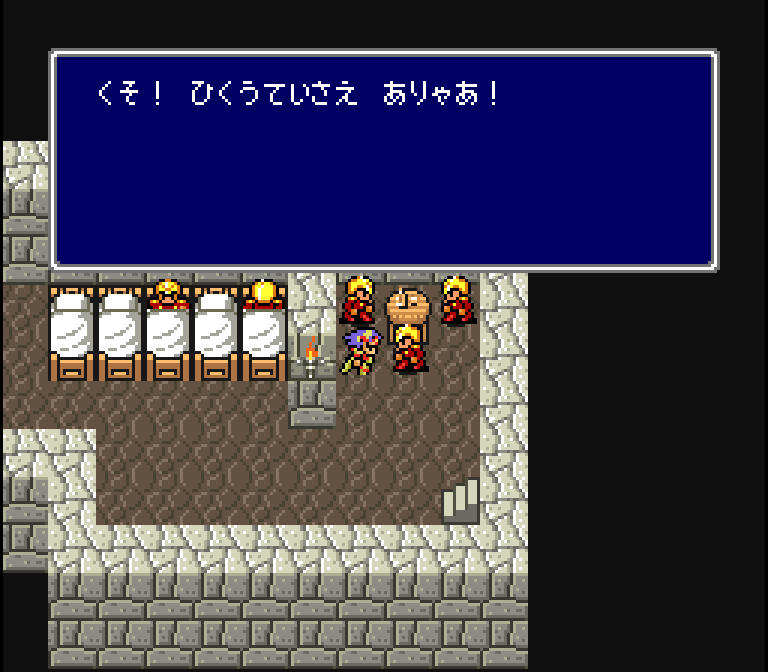 | 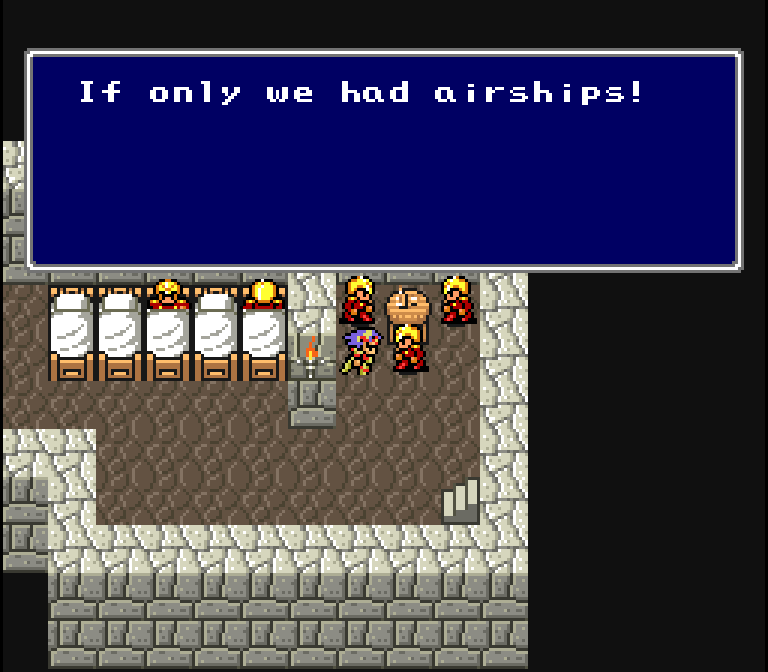 |
| Final Fantasy IV (Super Famicom) | Final Fantasy II (Super NES) |
Another member of the Red Wings laments the situation they’re in.
| Japanese Version (basic translation) | English Translation |
| Damn! If only we had airships! | If only we had airships! |
The swearing was removed from the final English translation, as you can see. It could’ve easily been replaced with something else, like, “Man! If only we had airships!” or even just, “Argh! If only we had airships!” but it just got yanked out entirely.
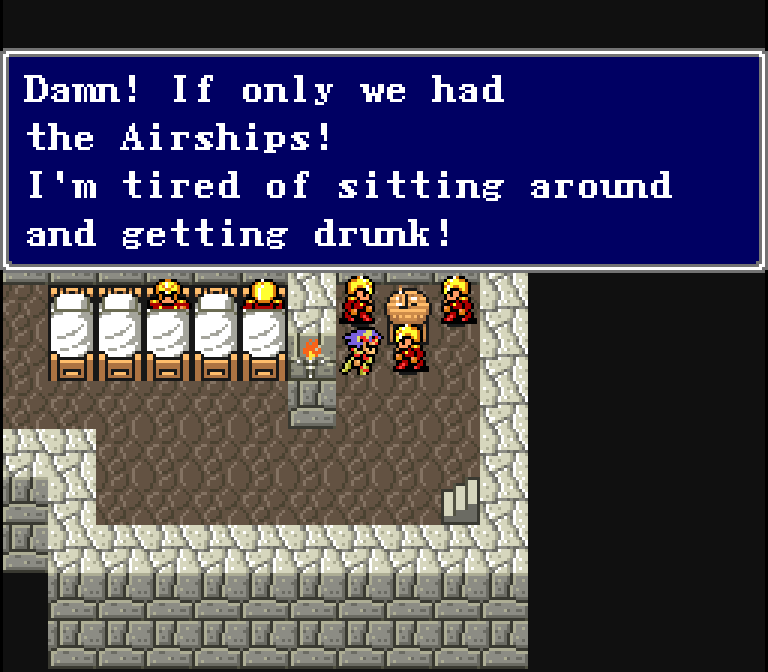 |  |
Since a swear is involved, let’s take a look at the fan translation:
| Japanese Version (basic translation) | J2e fan translation |
| Damn! If only we had airships! | Damn! If only we had the Airships! |
| I’m tired of sitting around and getting drunk! | |
| I wanna fight! |
Where did all that extra text come from? Why is Airships capitalized? Why was a drinking reference added in?
At first I thought maybe this added text was another pop culture reference of some sort, except I didn’t recognize it and an Internet search didn’t turn anything up. I genuinely don’t know where this text came from or why it was added.
Spooky Time
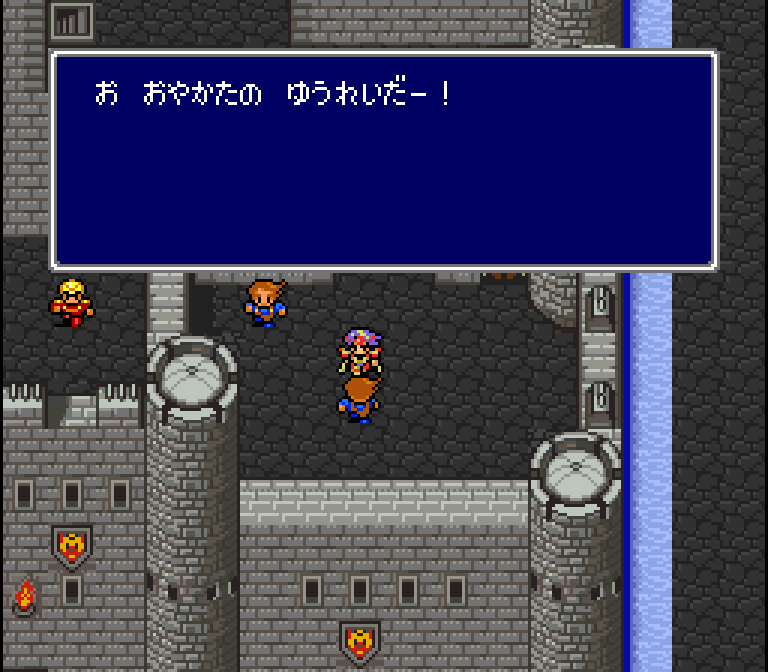 | 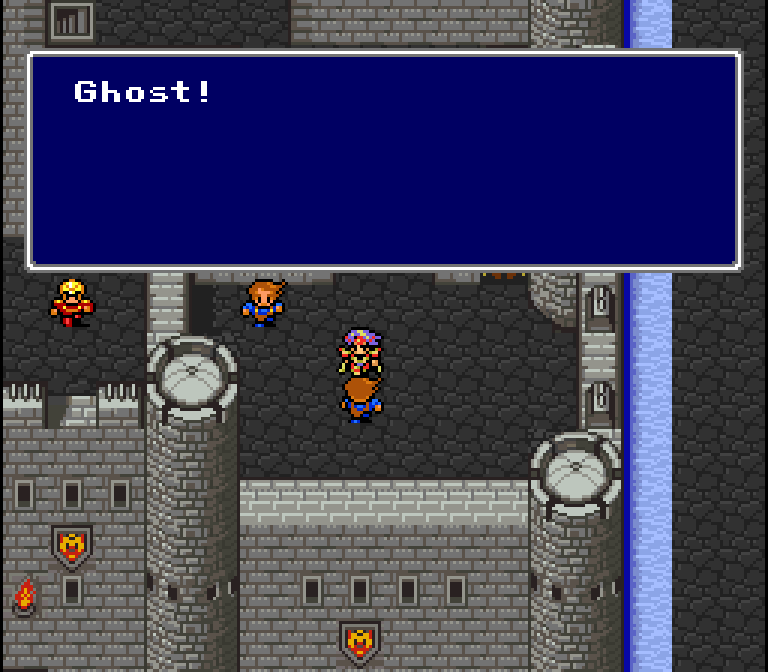 |
| Final Fantasy IV (Super Famicom) | Final Fantasy II (Super NES) |
One of Cid’s helpers reacts in a funny way if you talk to him:
| Japanese Version (basic translation) | English Translation |
| I-it’s our boss’s ghost! | Ghost! |
| Huh? | Real? |
| It’s really him? | Ah! Yes! |
| Time to work! Time to work! | I am working hard, sir! |
This English translation always confused me. I never knew what it was talking about. But now that I see it side-by-side with the Japanese text, it all makes sense. I guess this was probably an instance where the raw translation didn’t get much editing and polish, if any at all.
Treasure Trove
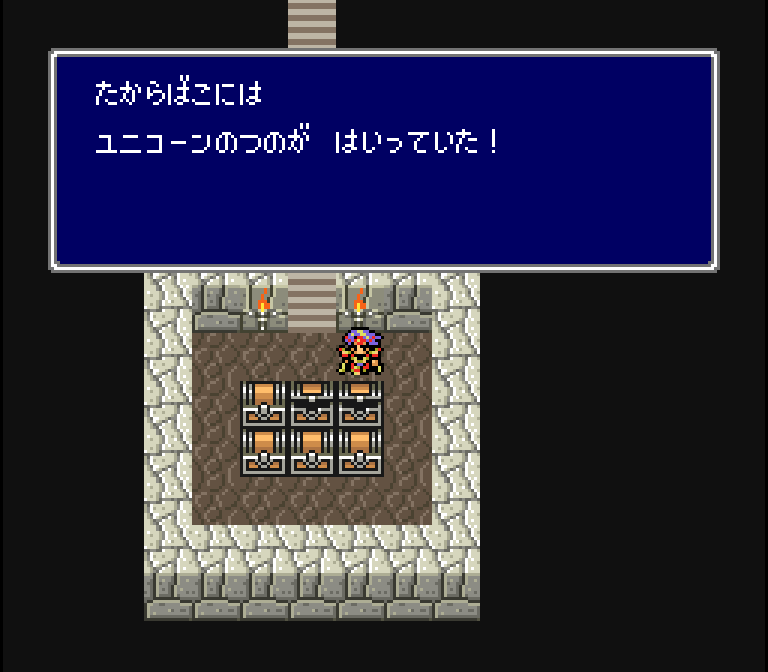 | 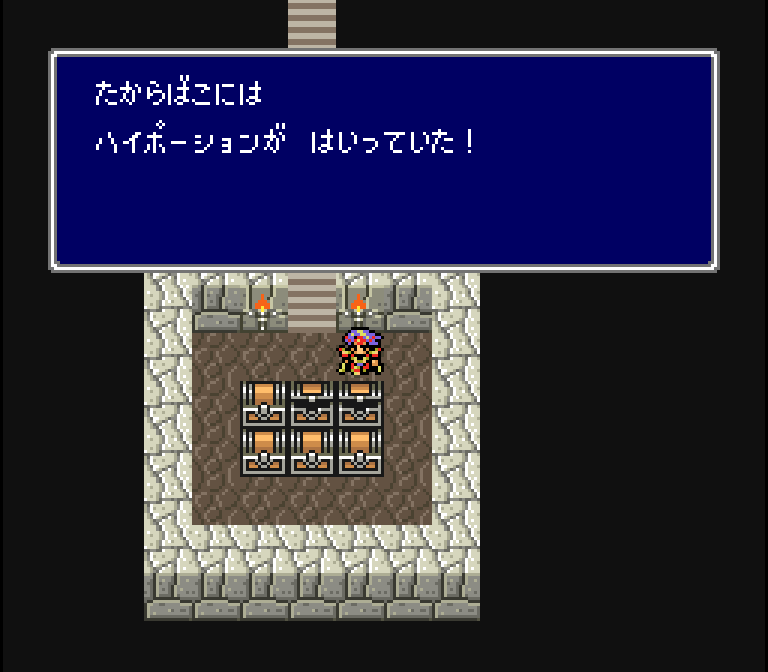 | 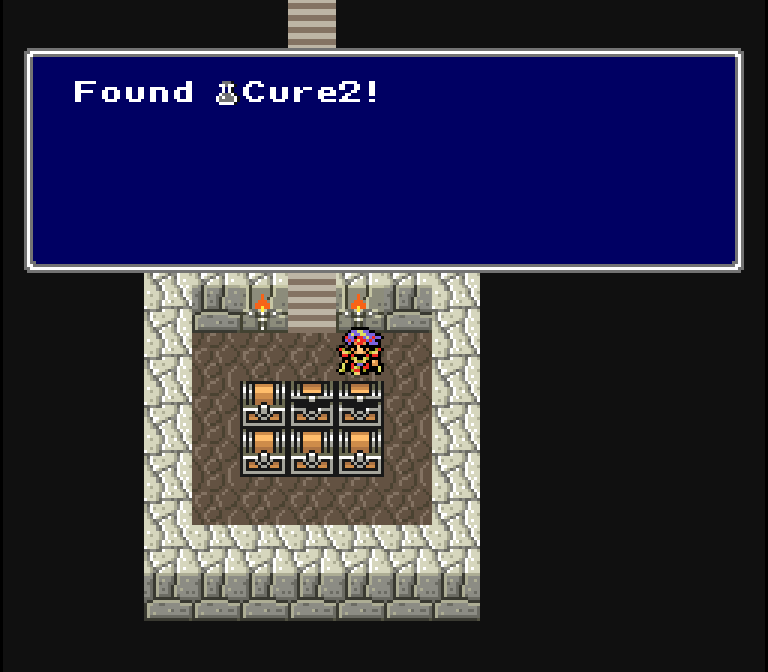 |
| Final Fantasy IV (Original) | Final Fantasy IV (Easy Type) | Final Fantasy II (Super NES) |
A number of the treasure chests have been changed to give different items in Easy Type and the English release. Here’s a look at them:
| Location: | Final Fantasy IV | Final Fantasy IV Easy Type | Final Fantasy II |
| Secret Room | Unicorn Horn | Hi-Potion | Cure2 |
| Secret Room | Unicorn Horn | Hi-Potion | Cure2 |
| 1F | Hermes Shoes | Heal-All Medicine | Heal |
| 1F | Hermes Shoes | Tent | Tent |
| 1F | Bacchus’ Wine | Potion | Cure1 |
| 2F | Hi-Potion | Revive Medicine | Life |
| B1F | Elixir | Piglet Sword | Elixir |
I’m slightly confused why they would change a Hi-Potion in the original game into a Revive Medicine/Life potion for the other versions. That’s such a weird little thing to change, you know?
Of course, the big change here is that the original Japanese game and the English game have an Elixir item, but Easy Type has a special Piglet Sword weapon…
The Piglet Sword
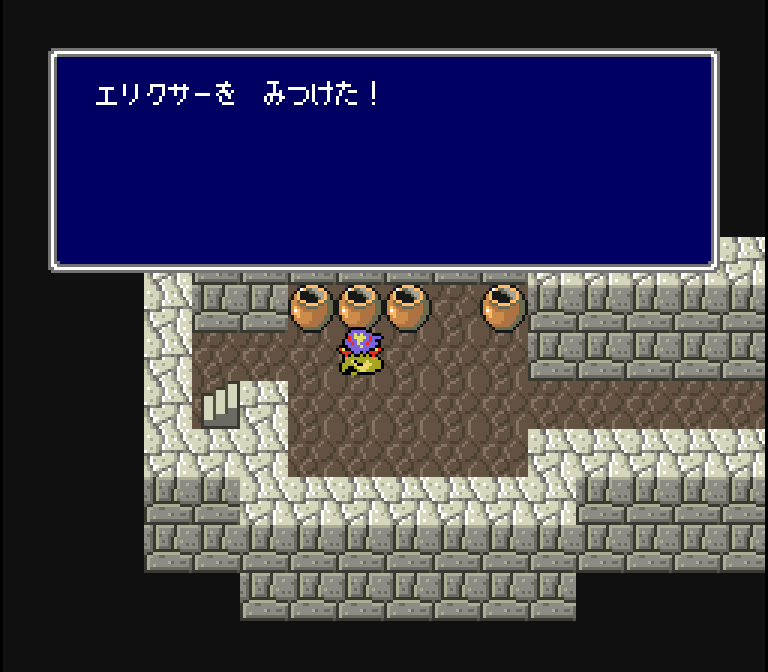 | 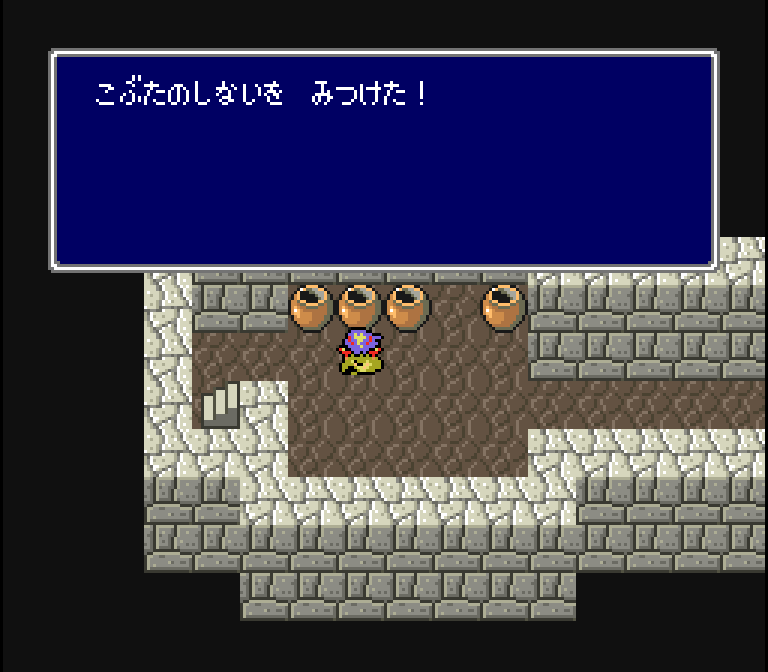 | 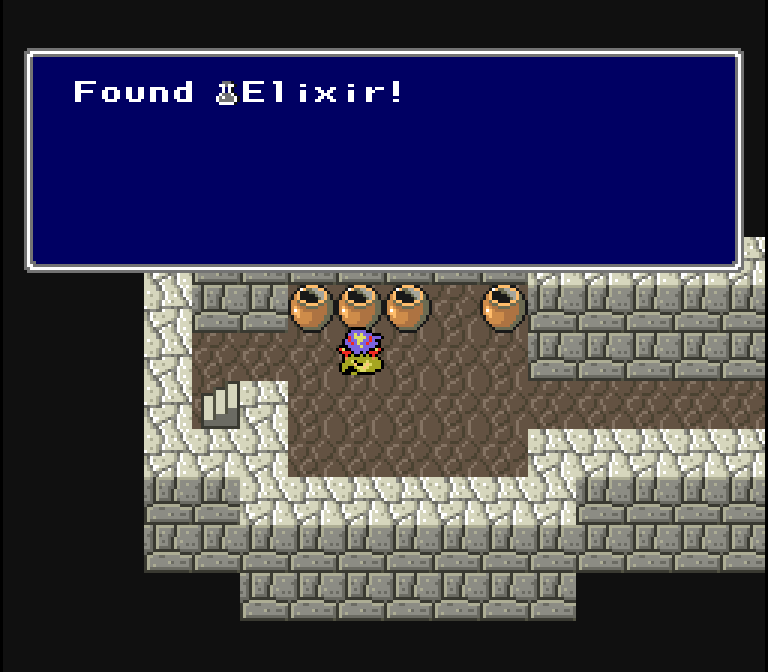 |
| Final Fantasy IV (Original) | Final Fantasy IV (Easy Type) | Final Fantasy II (Super NES) |
Indeed, one of the most well-known changes in Final Fantasy IV Easy Type is the addition of the Piglet Sword. The Japanese term is こぶたのしない and super-literally translates to “little pig shinai”. A “shinai” is a bamboo training weapon used in Japanese kendo. It’s used in place of an actual sword while practicing or training, since using actual swords is pretty dangerous. I’m sure there’s a lot more that can be said about the topic – if you’re interested, Wikipedia has a good article about them.
This sword has a few nice things about it:
- It’s a few points stronger than anything else available at this point in the game
- It can apparently turn enemies into pigs sometimes, although I haven’t had much luck with getting it to work myself
- Most of all, it’s not made of metal, which makes the upcoming magnetic dungeon much easier to traverse!
Apparently, to add this Piglet Sword into the game, another weapon had to be taken out – the Mithril Sword/Silver Sword. However, you can’t buy a Piglet Sword in Mithril Town/Silvera, even though you could buy the Mithril Sword/Silver Sword there in the other versions.
Aside from the above changes, the Piglet Sword is also slightly stronger and more accurate than the Mithril Sword/Silver Sword. All in all, it’s a pretty fancy sword, and you can get it for free!
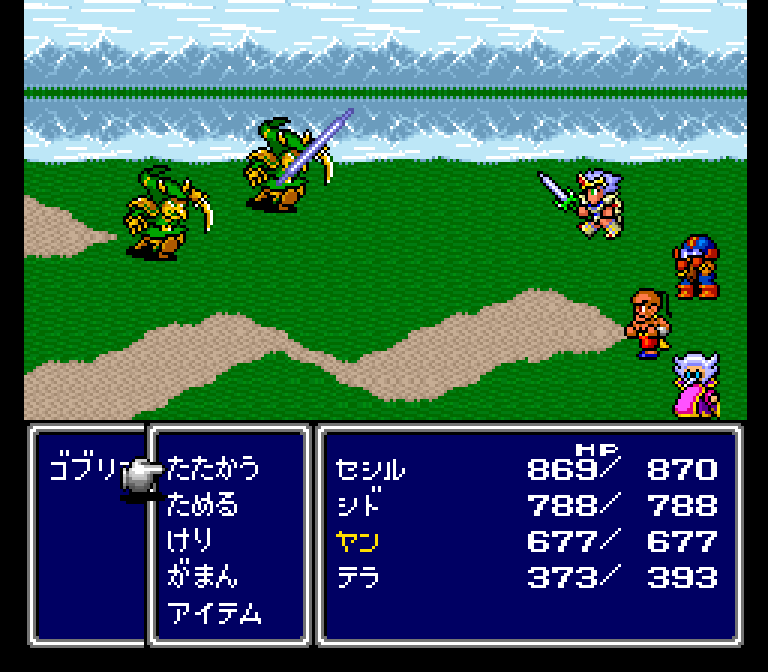 | 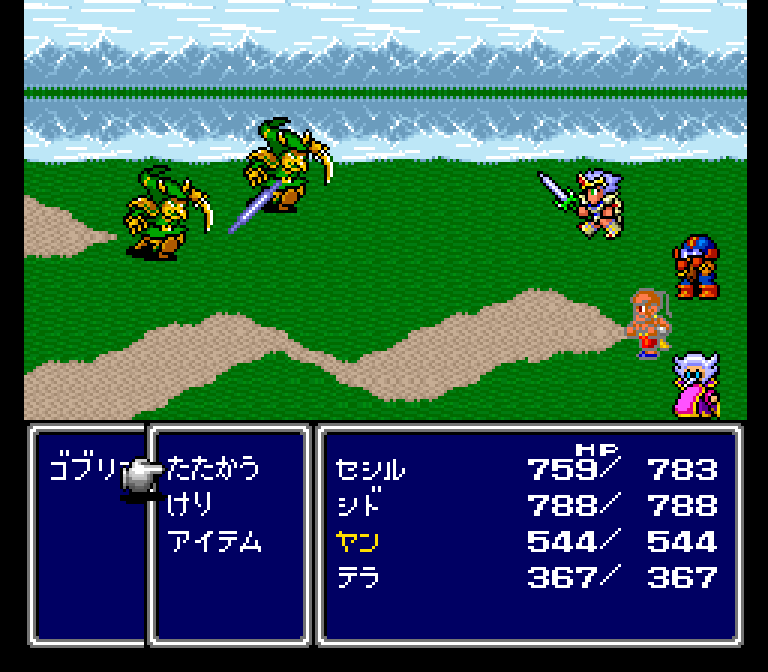 | 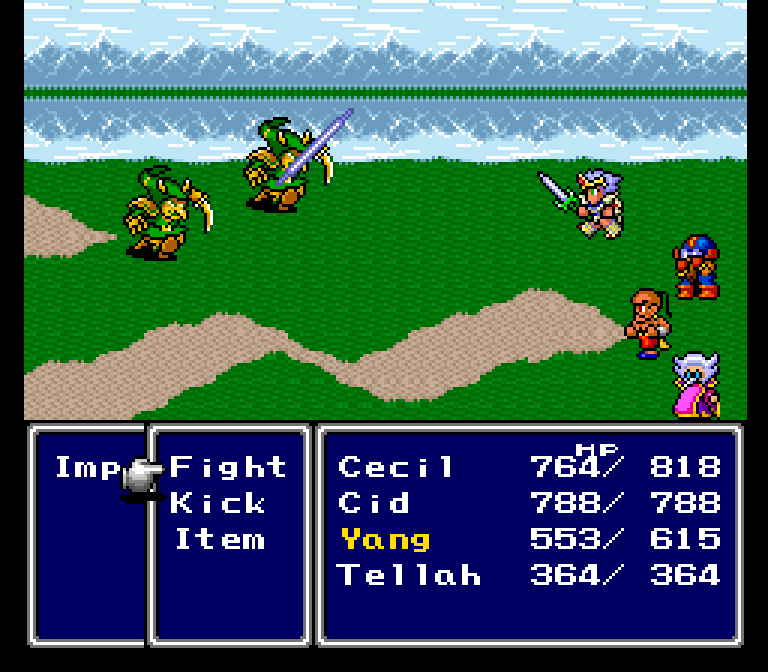 |
| Final Fantasy IV (Original) | Final Fantasy IV (Easy Type) | Final Fantasy II (Super NES) |
For reference, the Piglet Sword looks just like the other swords in battle – its sprite image wasn’t changed at all. It’s strange, though, because it doesn’t look like a bamboo sword at all.
The Underthrone
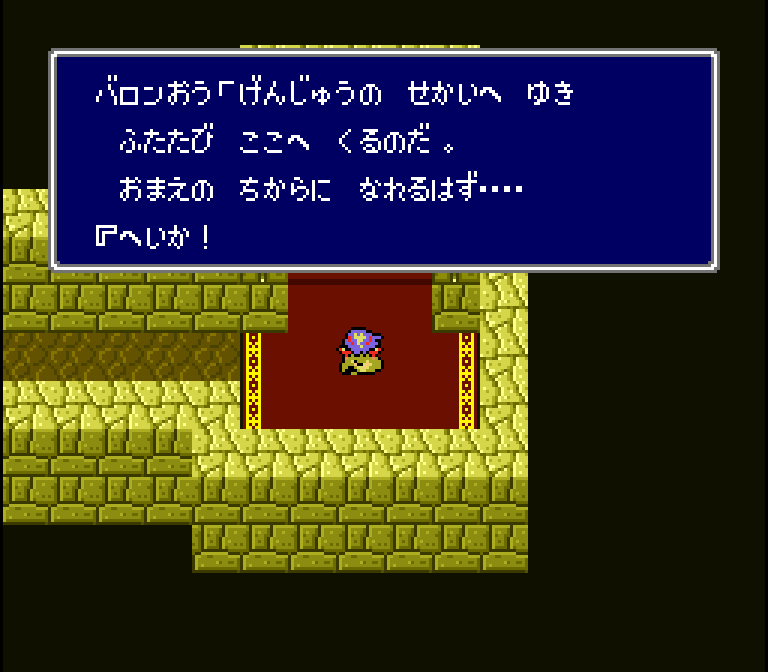 | 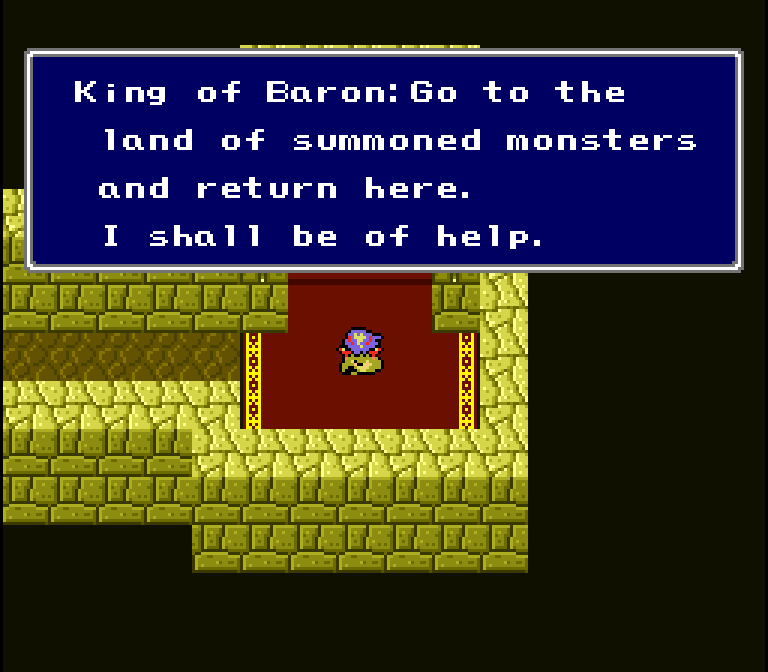 |
| Final Fantasy IV (Super Famicom) | Final Fantasy II (Super NES) |
At the very bottom of the castle is… another throne for some reason. If you walk near it, the ghost of the real king appears and gives Cecil a message.
| Japanese Version (basic translation) | English Translation |
| King Baron: Go to the world of the Eidolons and then return here. | King of Baron: Go to the land of summoned monsters and return here. |
| I will surely be of help to you…. | I shall be of help. |
| Cecil: Your Majesty! |
Not a whole lot is said here, but there’s a lot that can be found in the details.
- The translation of the king’s line is actually really good. In terms of translation quality, it feels a bit different and better than most of the other text in the game.
- Almost as if to confirm this, it says “King of Baron:” in the translation. Every other time in the translation it would consistently cut it down to simply say, “King:”.
- Cecil’s response is missing in the English translation.
Also, as mentioned way at the start of the game, the Japanese text calls these special creatures 幻獣 (genjuu), which is a made-up term that combines the kanji for “illusory/phantom” and the kanji for “beast/big monster/big creature”.
Different Final Fantasy games translated this term in different ways – in this game they’re called “Summoned Monsters”. In the Super NES Final Fantasy III translation they’re called “Espers”. In the Final Fantasy VII translation they’re called “Summons”. More recent translations try to stick with “Eidolons”. Fan translations like to go with “Phantom Beasts”.
I’ll probably go into more detail about all this “genjuu” stuff when the time comes in the game. For the sake of sanity and consistency, I’ll just refer to them as Eidolons whenever they come up during this Legends of Localization analysis.


![press start to translate [Final Fantasy IV] press start to translate [Final Fantasy IV]](https://legendsoflocalization.com/wp-content/uploads/2019/08/bbenma.png)
No Comments